
Your Trusted Advisors for Admissions Success
Admissions and test prep resources to help you get into your dream schools

How to Write a Great Research Assistant Cover Letter (Sample Included)
A step-by-step guide to writing an effective cover letter for a research position, including a full-length example.

a strong research assistant cover letter can help you secure an interview
Part 1: Introduction
Part 2: understanding the purpose of a research assistant cover letter, part 3: preparing to write an undergraduate research assistant cover letter, part 4: how to get a research assistant job when there are no ra job postings, part 5: drafting an entry level research assistant cover letter, part 6: research assistant cover letter example.
(Note: While this guide was primarily written for premed students looking to prepare a research assistant cover letter, the advice also applies to students who aren’t premed.)
Becoming a strong candidate for medical school is no easy task. A high GPA and strong MCAT scores just aren’t enough to guarantee your acceptance over other highly qualified applicants.
So, you’ve decided to gain research experience to strengthen the Work and Activities section of your application—smart choice. It’s practically a medical school requirement at this point, and applicants with at least one year of research experience are more likely to be considered by noteworthy programs.
You’ve searched your university’s science department websites and found a page listing various research opportunities. After reading a few lab descriptions, one completely captivated your attention.
This lab focuses on the area of medicine you’re hoping to specialize in. And, as a research assistant, you’d have the opportunity to contribute to important scientific breakthroughs. Plus, the lead researcher (aka, principal investigator, or PI) has a strong reputation in the medical and scientific fields. You know a medical school letter of recommendation from him would boost your applications.
You’re excited to apply for the research assistant position. You’ve already begun picturing yourself in the lab, engrossed in the work. You sit down to write the perfect cover letter for the perfect research position. But you freeze. The blank page stares back at you. Where do you start?
How do you write a cover letter for a research position? What should a research assistant cover letter include? What can you say to prove you’d be an exceptional research assistant?
And, here’s another concern: How do you write the best research assistant cover letter when you have no experience? You know you’ll be competing with classmates and even upperclassmen ahead of you. What will make the researcher choose you ?
First of all, know this: No one likes writing cover letters. Whether you’re an undergraduate student applying for a research position or a seasoned doctor applying to be chief of surgery. It’s not easy for anyone to summarize their experience, potential, and passion into a single page. But it’s far from impossible. There is a strategy for writing the best research assistant cover letter.
Keep reading to find out how you can maximize your chances of securing that coveted undergraduate research position.
Learn everything you need to know to get into medical school.
Get our free 102-page guide: Get Into Medical School: 6 Practical Lessons to Stand Out and Earn Your White Coat
100% privacy. No spam. Ever.
Thank you! Your guide is on its way. In the meantime, please let us know how we can help you crack the medical school admissions code . You can also learn more about our 1-on-1 medical school admissions support here .
Remember the ultimate goal of a cover letter—to secure a job interview.
No one gets hired based on a cover letter. But your research assistant cover letter may be the difference between meeting the researcher face-to-face to discuss your fit for the position and having your application tossed in the recycle bin.
Dozens of students might apply for a single undergraduate research position, but the principal investigator will only interview a handful. So how do you capture the PI’s attention and convince him that you belong in that select group?
You must demonstrate that you’re the best applicant—in other words, you’re the applicant most able to complete the work and exceed expectations.
This may be an intimidating concept, particularly if you have no research assistant experience and you’re competing with others who do. But don’t worry—you’re about to learn the secret to cover letters that not everyone takes the time to learn.
The key to an effective research assistant cover letter is marketing yourself.
What makes you different from other undergraduate students? What makes you more suited to the research position? What are your unique selling points?
As a science-minded person, marketing might not be your forte, and that’s perfectly fine. But it’s vital to the process of writing a cover letter. So what types of details should you market?
Your expertise in the research assistant job requirements or duties . For instance, Sydney earned a high grade in her Neurobiology Lab. In her cover letter for a neuroscience research position that lists brain sectioning as a primary task, she will highlight her experience and success with sectioning brains in her lab class.
Your unique perspective of the research problem . Sydney spent a summer shadowing a doctor at a neurology clinic. She will explain her distinct outlook on neurological disorders gained from that experience.
Your impressive qualifications that demonstrate your skills and work ethic . Sydney’s professor chose her to be a peer tutor for the Molecular Biology course. She’ll use this recognition to show that she rises to the top of her class.
Your passion that relates to the research focus . Sydney will reveal her dream to become a neurologist and contribute to a cure for Alzheimer’s. Some researchers might be excited to support her career goals. But, more importantly, having a strong interest in the research area indicates that she’ll be committed to the work.
Demonstrate you’re the best candidate by proving—not just stating—your qualifications.
You can make statements about having experience relevant to the research assistant position, but it won’t mean anything to the principal investigator without evidence. You’ll want to use details, numbers, and results to prove all the claims in your cover letter.
For instance, instead of Sydney writing vaguely, “I have experience with brain mapping,” she should be more specific. “For a class project, I used EEG equipment to map the brain activity of two classmates while they completed memory tests. We analyzed the resulting data to compare their short term and working memory abilities.”
The second statement provides more information about the depth of her experience and her capabilities. It also offers a conversation starter for the PI when he interviews Sydney for the entry-level research assistant position.
One more example. Sydney could write, “I have a passion to cure neurological disorders.” But it would be more effective to prove her passion. “I’ve further developed my passion for curing neurological disorders by volunteering as a learning aide at a dementia care facility.”
Identify the main keywords, qualifications, and duties listed in the research assistant job description.
Read through the listing closely. Highlight or jot down important phrases. You can present yourself as the perfect undergraduate for the research position by echoing the key language used by the researcher.
For instance, “Dr. Carton’s research is centered on neural circuitry , specifically how it leads to understanding the neurobiology of learning and memory .” If you have experience with or an interest in these subjects, you can feature it prominently in your cover letter.
Job descriptions usually include too many keywords or job duties for you to address—it’s a cover letter, not a novel. Select three or four phrases to focus on, based on a balance between what roles seem most important and where you have the strongest experience or interest.
Here’s an example. Many research assistant job postings mention “the ability to work independently” as a requirement. Maybe you have a lot of experience and strength in that area. But you wouldn’t want to focus your cover letter exclusively on your skill at working independently, not at the cost of demonstrating your research and scientific abilities.
Make sure you include evidence of your knowledge or experience in these three areas:
The research focus or the wider field of science it belongs to
A primary task required of the research assistant
A crucial but non-scientific skill (e.g., collaboration, initiative, organization)
Seek inside information to strengthen your cover letter.
Reach out to people with research experience to ensure you’re focusing on the right qualifications. This could be a close professor, your TA, or a current undergraduate research assistant. Here’s one way you might seek advice from your professor via email:
Dear Professor Manette,
I hope your week is going well. I’ve decided to apply for the undergraduate research assistant position under Dr. Carton. I’m excited by his research on neural circuit function, which aligns closely with my interest in neurological disorders.
I’m seeking your advice on writing the cover letter for the research position. I want to communicate my fit and excitement for the role sufficiently to Dr. Carton.
Having worked with undergraduate research assistants yourself, what would you say are the most valuable characteristics or skills for a research assistant to possess?
Thank you in advance for any input or advice you can offer.
Best, Sydney Darnay
Use the feedback you receive to confirm or adjust the areas you intend to focus on in your undergraduate research assistant cover letter.
Search for research assistant positions on your own.
If your university doesn’t advertise undergraduate research assistant positions, you’ll have to do a little extra digging to find research opportunities.
First, check to see if your science department has a web page describing faculty research interests (the Stanford University Department of Biology Research Areas website is an example). Take the time to explore professors’ previous and current research projects. You should read their recent publications and watch videos of their lectures, if possible.
Please note: all university websites are not created equal. Some might provide links to the professors’ research sites, making your exploration easy. Or you might find a mere list of faculty research topics with no descriptions or current updates, leaving you to search Google for better info. If an internet search isn’t proving fruitful, ask a department staff member (e.g. student advisor or lab coordinator) for a more detailed run-down of the professors’ current research projects.
Next, select four or five professors whose work most excites you to contact with your research assistant request. Remember to tailor each cover letter specifically to the research project you’re applying to join. The best undergraduate research assistant cover letters are highly specific to the lab and researcher, not generic.
Email the principal investigator your cover letter and resume.
You should type your research assistant cover letter in the body of your email, and attach your resume as a pdf document.
Use a clear subject line to grab the PI’s attention and persuade him to open your email rather than send it to the trash. Remember, this professor hasn’t posted an open research assistant position, so he’s not expecting to receive applications. Here are a few examples of email subject lines you might consider:
Dr. Carton, can I assist with your neural circuit research?
In need of a research assistant with brain mapping expertise?
Professor Manette recommended I reach out regarding your research (if you indeed can use a professor as a reference)
Consider the best time of year to send out your research assistant cover letter.
If you want to secure a research assistant position during the academic year, you should email your cover letter to principal investigators mid-summer, before the fall semester starts. Professors at this time are typically finishing their summer research while looking ahead and planning for the impending academic year. You have the perfect opportunity to become part of their research plans.
If you’ve missed that window and it’s already the middle of the fall semester, you have two options. First, you can reach out and inquire about becoming a research assistant for the spring semester. You might get lucky if a current research assistant is stepping down or graduating mid-year. Otherwise, your second option is to wait until the spring semester and ask to join the summer research team.
Follow up if you don’t receive a reply.
Wait a week—but no longer—before following up with a principal investigator. Make your follow-up email very brief. Send it as a reply to your original email containing your cover letter and your attached resume, so the professor can easily review your initial research assistant request. Here’s an appropriate way to follow up via email:
Subject: Following up about assisting your neural circuit research
Dear Dr. Carton,
I wanted to quickly follow up on the possibility of joining your team as a research assistant. I know you’re busy, and I hope that as your research assistant I could take some work off your hands.
Please see my original email to review my qualifications and the passion I have for your work examining how neural circuit function contributes to neurological disorders. I would love the opportunity to meet with you and discuss how I can contribute to your research further.
Sydney Darnay
It’s appropriate to send one follow-up email, but do not continue to pester the principal investigator if you still don’t receive a reply. At that point, widen your search and find other PI’s to approach with your research assistant application.
Want expert guidance on medical school admissions?
Enter your name and email for weekly advice plus our free 102-page guide to help you with every step: Get Into Medical School: 6 Practical Lessons to Stand Out and Earn Your White Coat
Part 5: Drafting an entry-level research assistant cover letter
Formatting your cover letter correctly.
Your research assistant cover letter should be one page, single- or 1.5-spaced and contain 4–5 paragraphs. Each paragraph will have a specific purpose. Here’s an outline showing the best format for research assistant cover letters.
Introductory paragraph: Express your excitement for the research assistant position.
2–3 middle paragraphs: Demonstrate how your skills, experience, and passion make you the best research assistant candidate.
Closing paragraph: Reiterate your unique fit for the role and request an interview.
You want to break up the middle section into multiple paragraphs for the ease of the researcher reading your cover letter. One long paragraph is more tiresome (and more confusing) to read than two or three short paragraphs, each one addressing a specific area—skills, experience, or passion.
Remember: the researcher may be reviewing dozens of applications for a single research assistant position. Your cover letter needs to be direct and concise. This is formal communication, so use Times New Roman, 12-pt font and one-inch margins on your page. Submit your cover letter as a PDF document to avoid any formatting changes when the researcher downloads it.
Writing a research assistant cover letter with no experience
It can be frustrating when you seem to need experience for even entry-level research assistant positions. But, researchers will be willing to overlook a lack of official research experience if you can demonstrate the knowledge and skills needed to be an exceptional research assistant.
The trick is to translate other work and experience to relate to the research position. Here are several ways through which you can effectively do that:
Describe relevant coursework or lab work, including the applicable procedures you completed and the final results you achieved.
Recount pertinent extracurricular projects or volunteer work.
Share notable recognition you’ve earned from professors (don’t be afraid to name drop as long as you’re confident the professor will speak highly of you).
Discuss an undergraduate paper or thesis on the area of research.
Illustrate your experience with tools or methods similar to those employed in the research position.
Describe a situation when you effectively collaborated with others (i.e. group project).
Connect tasks completed in previous roles with research assistant tasks (i.e. data analysis).
Use an example to show your capability to learn quickly, take initiative, and exceed your employer’s expectations.
Maximizing each component of your cover letter for a research assistant position
Address the salutation to the principal investigator. Using “To Whom It May Concern” or “Dear Sir/Madam” suggests you didn’t take the time to identify the researcher leading the project. If the researcher’s name isn’t included in the research assistant job posting, call or email a department staff member to find it.
Show excitement and confidence in your introduction. Start out your cover letter strong by expressing your interest and showing a bit of your personality. Alluding to your experience and knowledge of the research area will pique the researcher’s interest and keep him reading to determine if you’re a good fit for the research assistant position.
Craft a focused, detailed body of your cover letter addressing the research position specifics. Spend 2–3 paragraphs connecting your knowledge and experience with the job duties and qualifications. This is your chance to prove you will excel as his research assistant and persuade him to bring you in for an interview.
In Sydney’s cover letter below, she uses two paragraphs of the body to demonstrate her expertise in the primary tasks of the research assistant position. Brain sectioning, brain mapping, analyzing data, and scientific writing are duties listed in the job description. Notice how she goes into detail to prove her experience, rather than merely state it.
Sydney uses the final paragraph in the body of her cover letter to reveal her unique perspective on the research area and her passion for this area of science. She even references one of the principal investigator’s previous research publications, which proves she has a true interest in the work done at his lab.
A quick note about language. Avoid using “very” or “really” to describe your level of experience or interest. They’re filler words that weaken the impact of your cover letter. Instead, use stronger descriptors and action words . For example, “I find your research inspiring” or “captivating” instead of “very interesting.”
Remember: you want to come across as professional, but not stiff or robotic. Imagine you’re in office hours with a revered professor for the first time. When you speak, you’d still sound like you, just a more put-together version of yourself. That’s what you’re aiming for.
Close your cover letter confidently with a reference to receiving an interview invitation. Reiterate that you’re fit for the research assistant position, that you will add value to the team. You don’t want to sound pushy or arrogant by directly asking for an interview. But indicate your interest and suggest that it will be well worth the researcher’s time.
In this example, Sydney is replying to the following job posting for a research assistant.
“Dr. Carton’s research focuses on how neural circuitry affects perception, cognition, and behavior, which plays an important role in understanding the mechanistic basis of neurological disorders. The research centers on the study of neural circuit organization and function. Undergraduate research assistants are needed to complete work including brain sectioning and immunostaining, brain mapping, slice imaging, and data analysis. After training, research assistants are expected to conduct independent projects that require them to collect and analyze data, summarize it into scientific writing, and present the data to the team. In the past, some research assistants have been included as co-authors on Dr. Carton’s formal publications.”
Here’s an example of an excellent cover letter for an undergraduate research assistant that you can use as a template.
Subject: Research Assistant Application for Sydney Darnay
Sydney Darnay 500 Tellson’s Way Palm Desert, CA 12345 [email protected] (555) 433-2211
February 10, 2021
Dr. Alexander Carton Professor of Neurobiology, University of California - Palm Springs 1000 Greek Street Palm Springs, CA 12345 [email protected]
Dear Dr. Carton,
I am excited to submit my application to be considered for the research assistant position on your Neuroscience Research team. As a Neurobiology major, I have gained the knowledge and experience necessary to contribute to your research on neural circuit organization and function. My skills, combined with a fervent interest in your research on the mechanistic basis of neurological disorders, make me an excellent fit for this role.
In my Neurobiology Lab, I sectioned the brain tissues of a rabbit and a sheep, earning a perfect score for following the correct protocol. For an Advanced Neurobiology project, I used EEG equipment to map the brain activity of two classmates while they completed memory tests. We analyzed the resulting data to compare their short term and working memory abilities. I took the initiative to gain more experience analyzing data by using PyMVPA software for neural decoding with the guidance of my faculty mentor.
Last year I discovered my skills in scientific writing. My professor selected my piece on molecular genetics to use as an example for future students. I have continued improving my skills by meeting regularly with a tutor at the Writing Center and am confident that I would be an excellent co-author in one of your formal publications.
Prior to freshman year, I shadowed a neurologist specializing in work with Alzheimer’s patients. Observing her work gave me a unique perspective of neurological disorders, as well as a passion for finding cures. I have further developed that passion by volunteering as a learning aide at a dementia care facility, where I observe and record results of cognitive tests. I was captivated by your recent research on the relationship between neural circuit architecture and working memory, as well as the positive implications it holds for patients suffering from dementia. I hope for the opportunity to contribute to your future findings on cognition and memory.
I plan to devote my career—as you have—to increase our understanding of the brain and improve the lives of individuals with neurological disorders. Your lab perfectly aligns with my scientific and medical interests. I would appreciate the opportunity to discuss your research project with you and the contributions I can make as your research assistant.
Sincerely, Sydney Darnay
In this letter, Sydney establishes her experience and knowledge, not to mention her familiarity with Dr. Carton’s work. On top of this, she comes across as polite, professional, and enthusiastic, while demonstrating that she can write well. All of this goes a long way towards demonstrating that she would be an excellent fit for the job.
There you have it! Everything you need to create a compelling research assistant cover letter that will captivate the researcher’s attention and secure you an interview.

About the Author
Dr. Shirag Shemmassian is the Founder of Shemmassian Academic Consulting and one of the world's foremost experts on medical school admissions. For nearly 20 years, he and his team have helped thousands of students get into medical school using his exclusive approach.
Over 90% of our students get into med school—the first time.
Get our free guide to help you with every step: Get Into Medical School: 6 Practical Lessons to Stand Out and Earn Your White Coat
Thank you! Your guide is on its way. In the meantime, please let us know how we can help you crack the the medical school admissions code . You can also learn more about our 1-on-1 medical school admissions support here .

How to Ask to Shadow a Doctor (Example Scripts Included)

How to Choose the Right Extracurricular Activities for Medical School

MD-PhD Programs: The Ultimate Guide
11 Professional Research Assistant Cover Letter Examples for 2024
Your research assistant cover letter should immediately highlight your keen attention to detail. This quality is non-negotiable for success in compiling and analyzing data efficiently. Consistently demonstrate your ability to support complex research projects with precision. Your cover letter must reflect a proactive approach and a solid understanding of the research process.
All cover letter examples in this guide
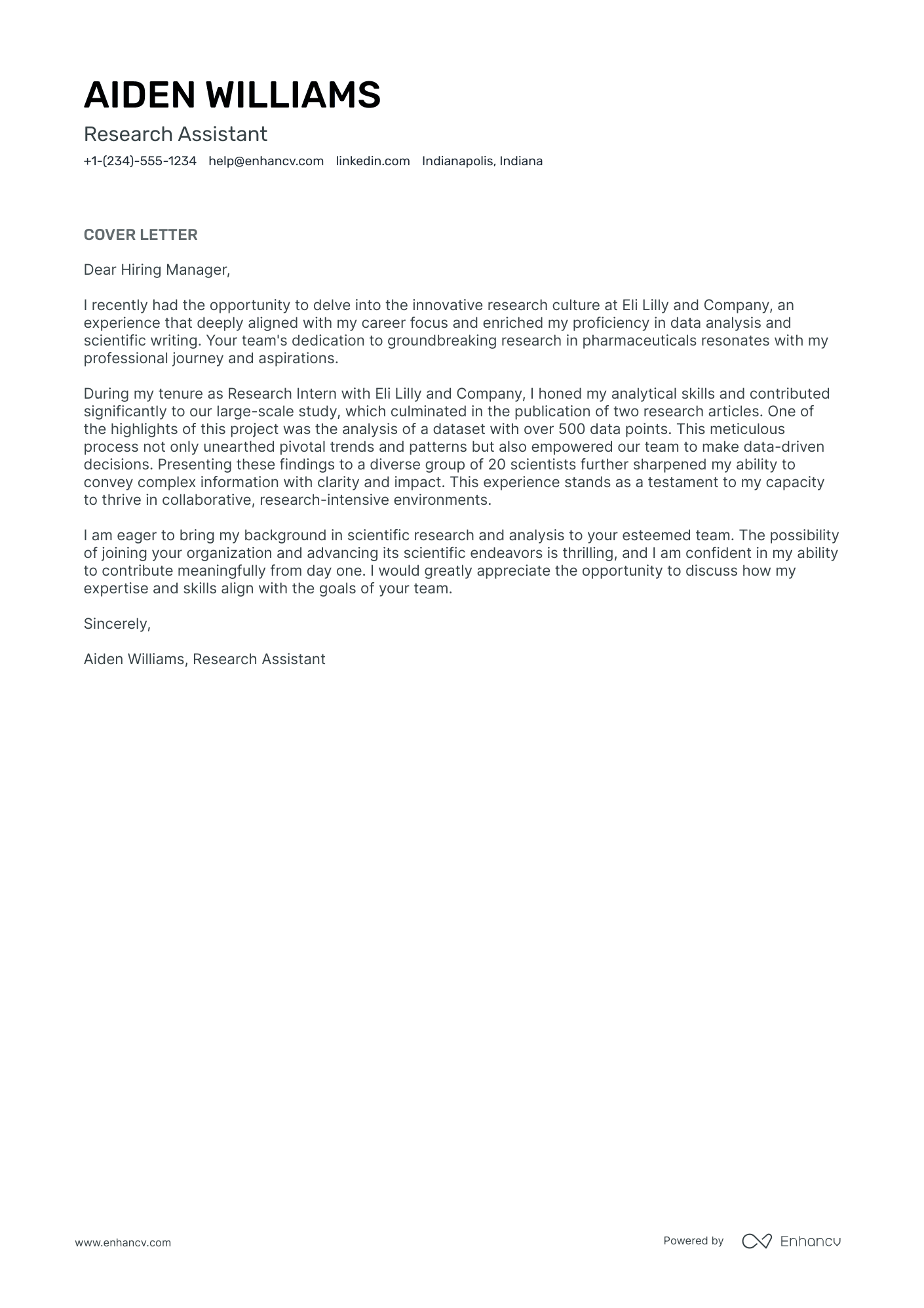
Entry-Level Research Assistant
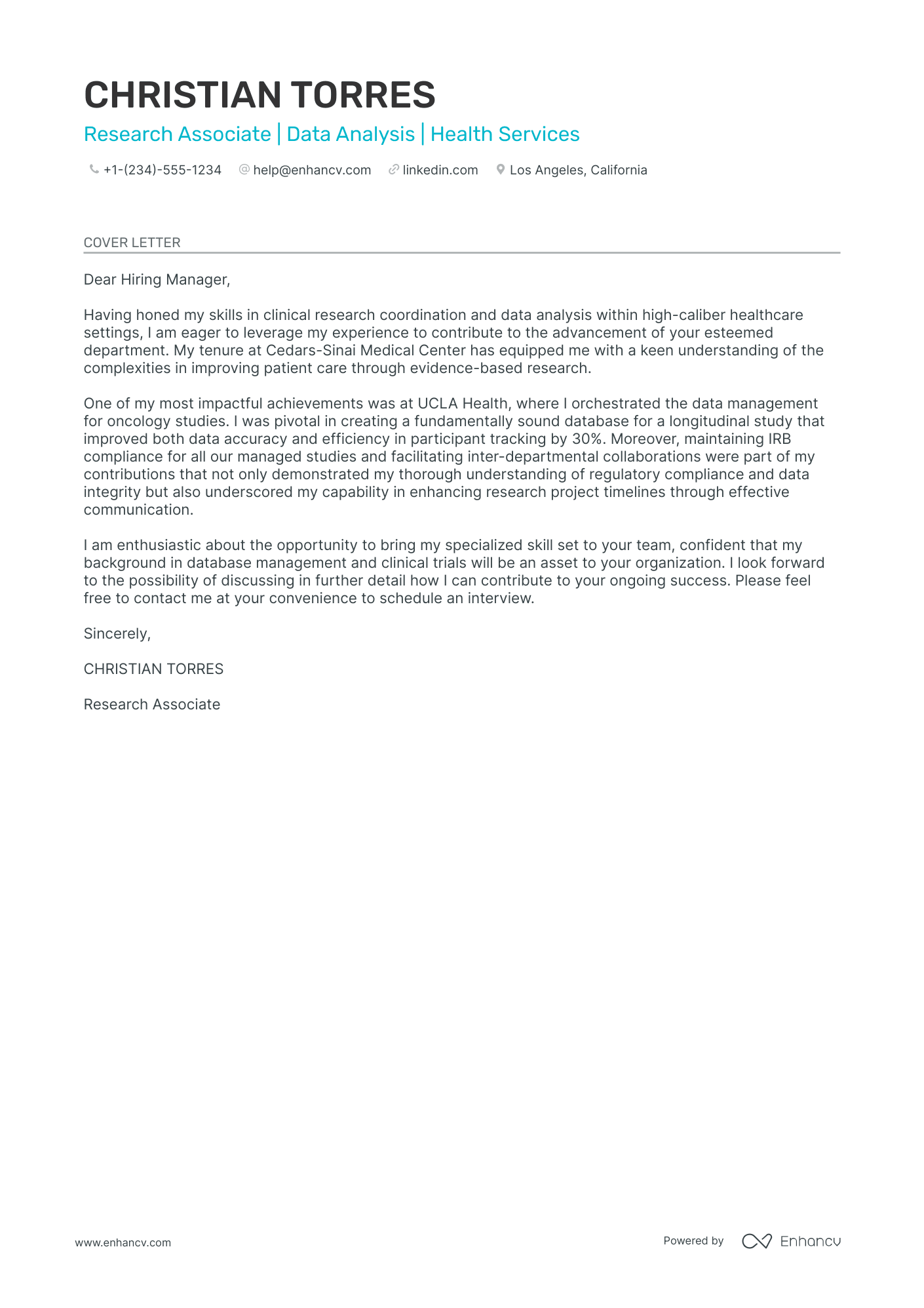
Research Associate
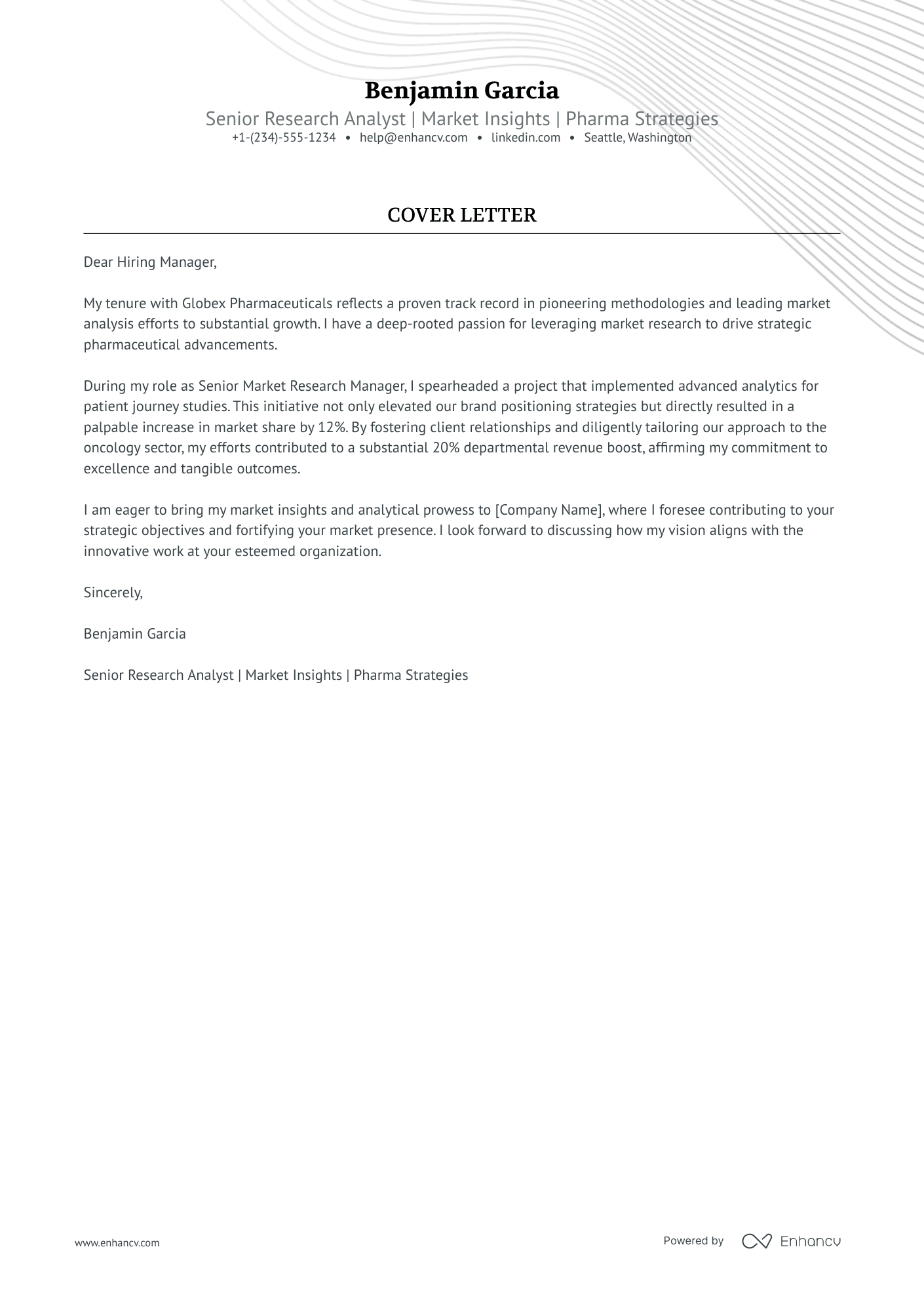
Research Director
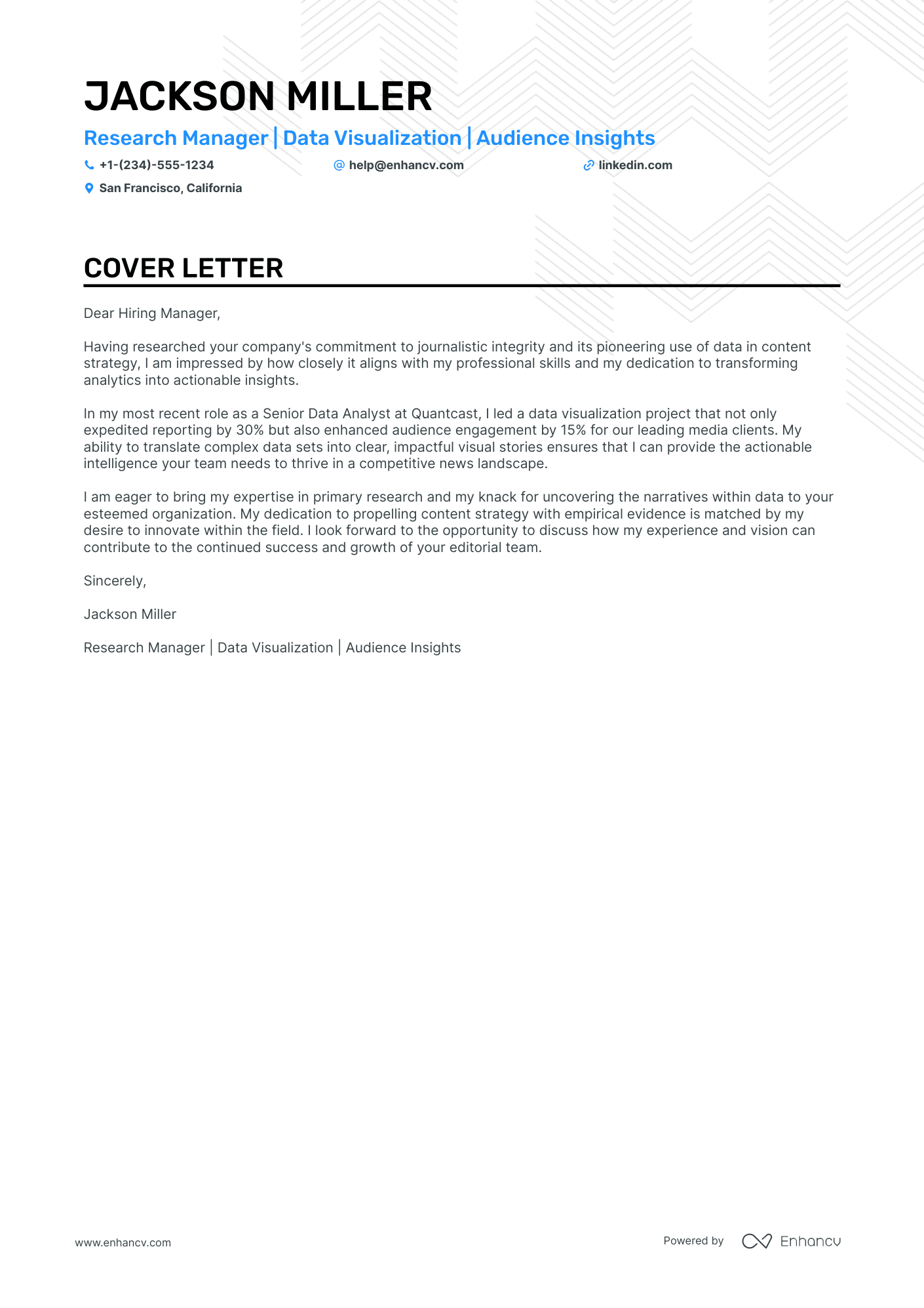
Research Manager
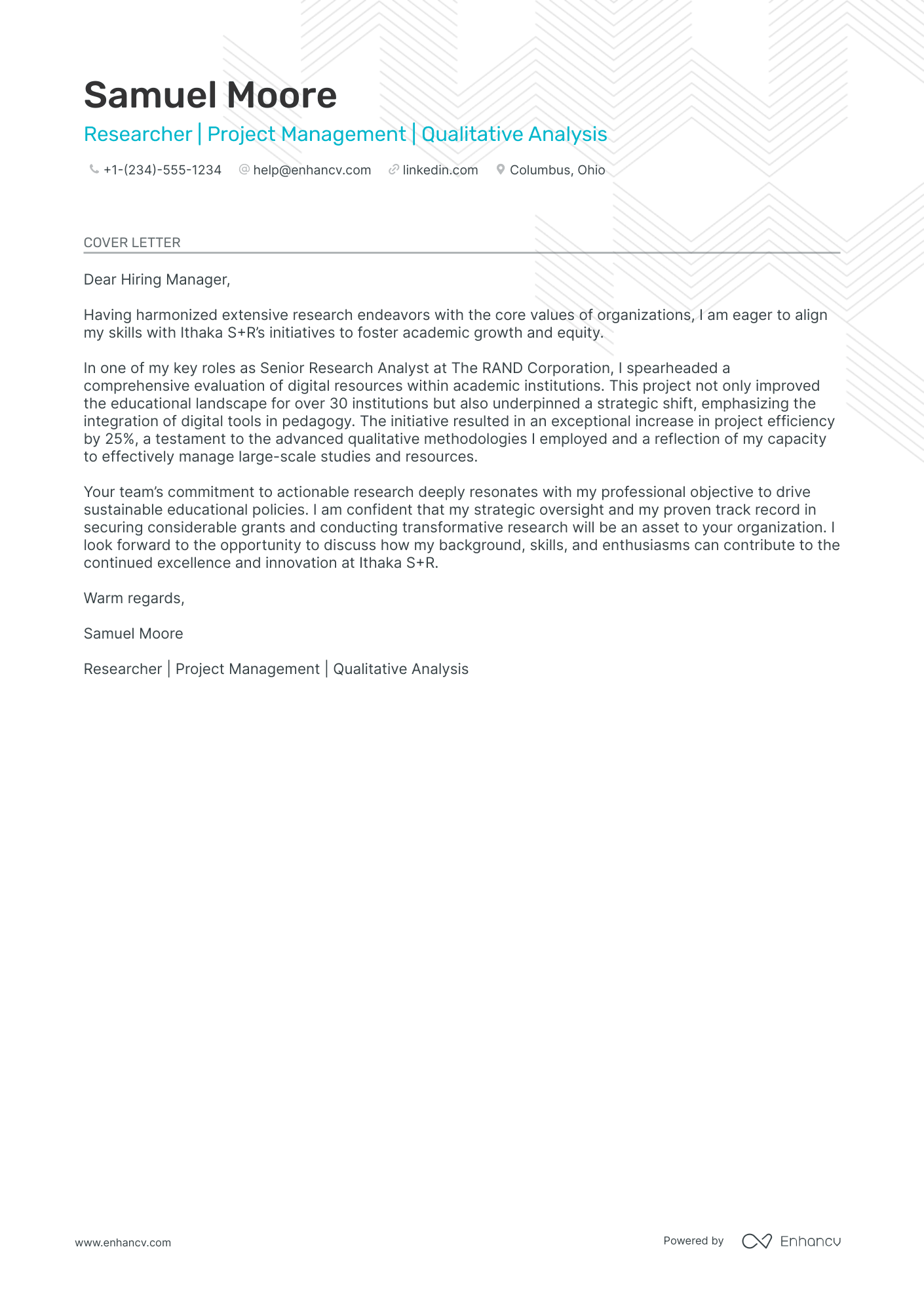
Clinical Research Assistant
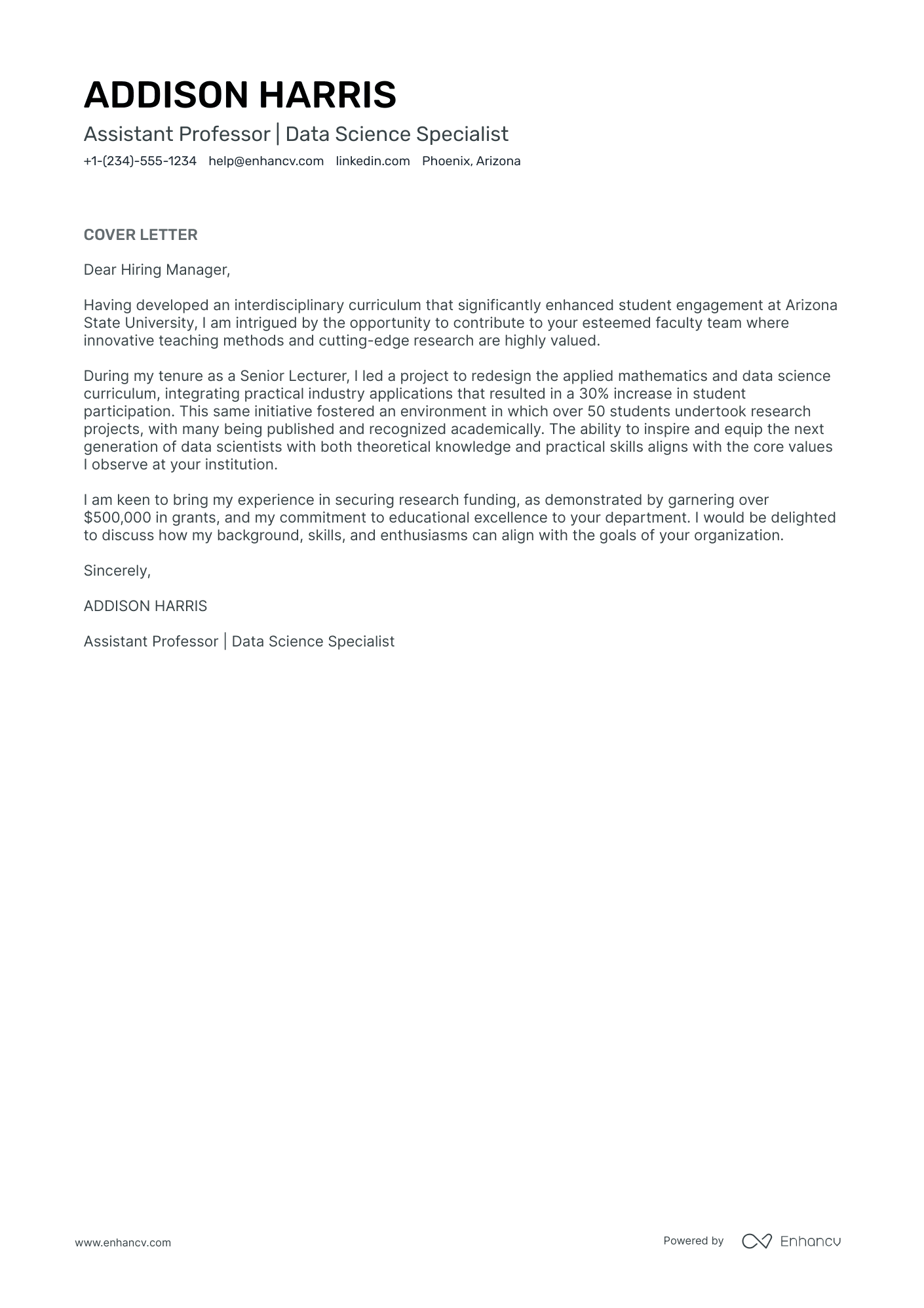
Postdoctoral Research Assistant
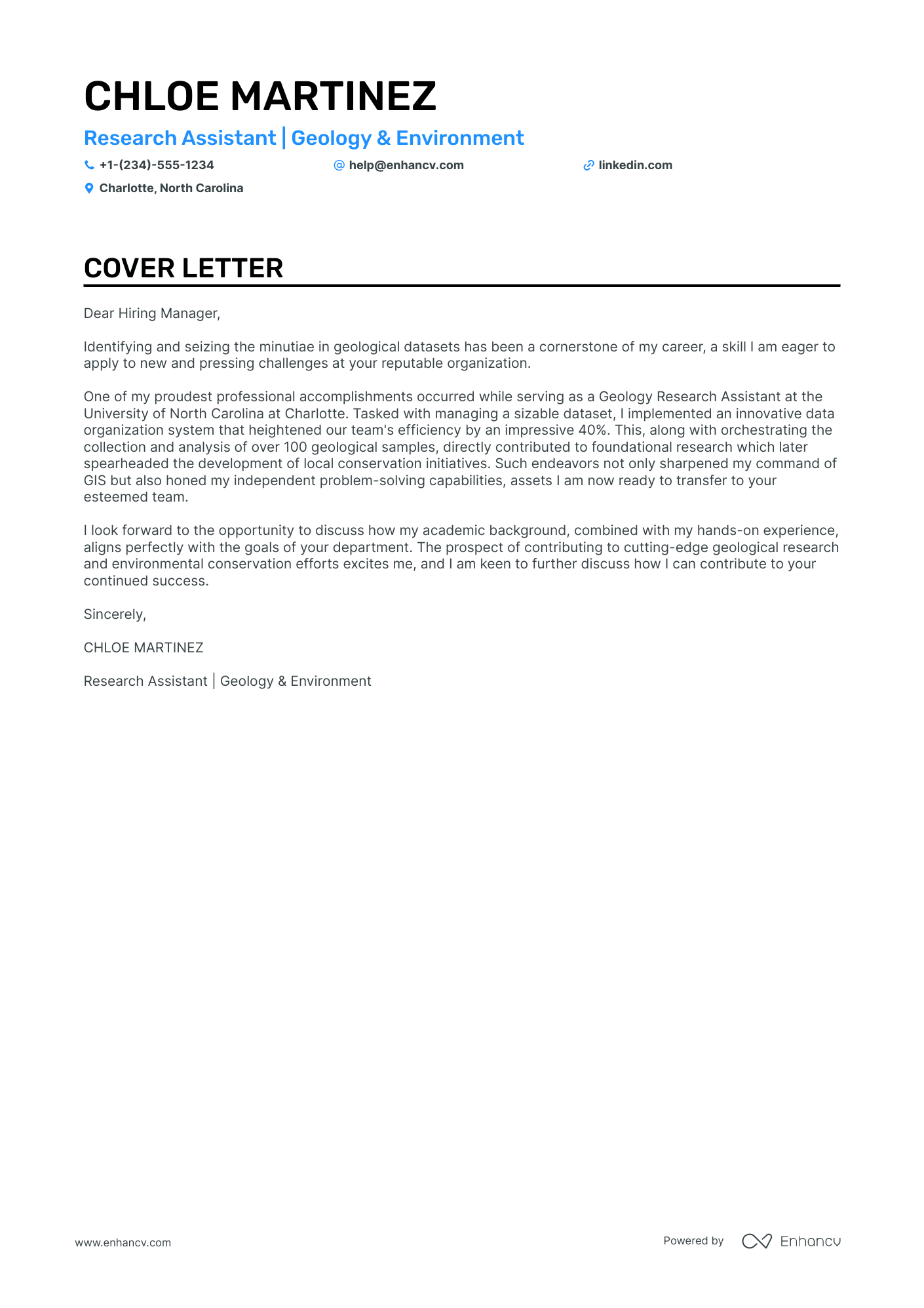
Undergraduate Research Assistant
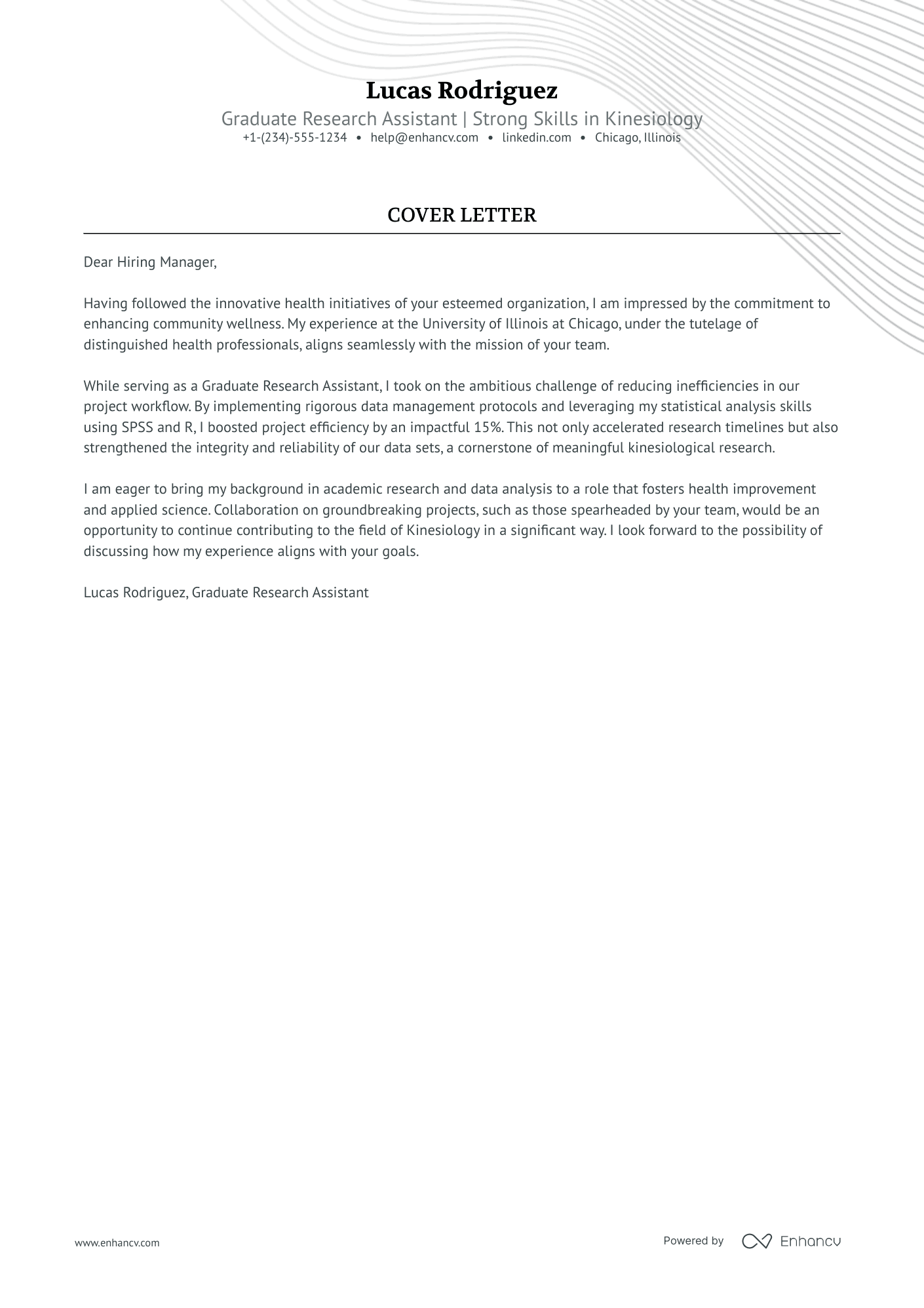
Graduate Research Assistant
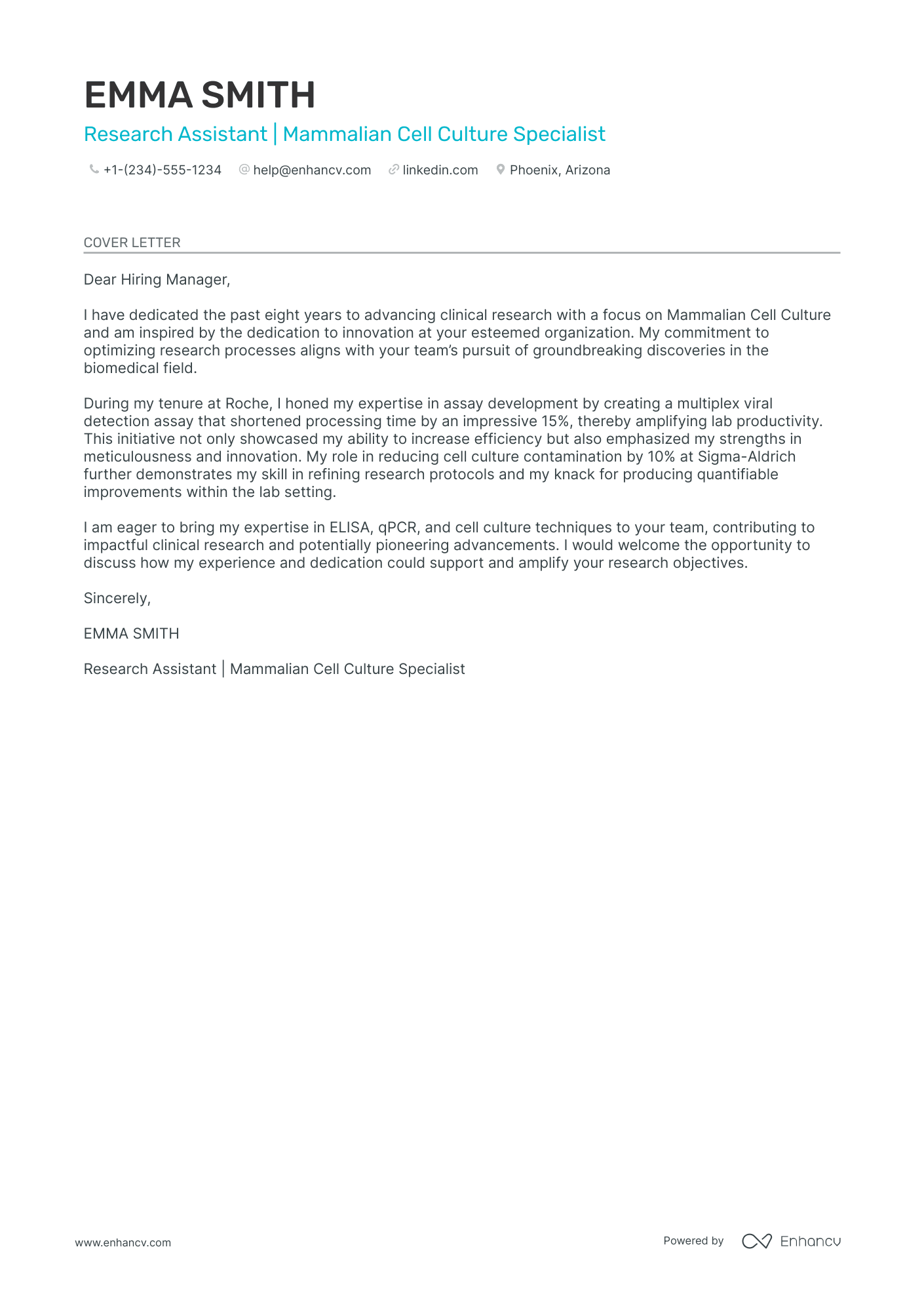
Laboratory Research Assistant
Cover letter guide.
Research Assistant Cover Letter Sample
Cover Letter Format
Cover Letter Salutation
Cover Letter Introduction
Cover Letter Body
Cover Letter Closing
No Experience Research Assistant Cover Letter
Key Takeaways
By Experience

Embarking on the quest for a research assistant role, you've likely encountered the pivotal step of crafting a compelling cover letter. It's not just about parroting your resume; your cover letter should weave a narrative around a standout professional triumph, capturing the essence of your expertise without resorting to overused clichés. Remember, keeping it concise within a single page is key. Let's navigate these waters together, ensuring your cover letter showcases your achievements with clarity and impact.
- Introduce your profile to catch recruiters' attention;
- Use professional templates and examples to make sure your research assistant cover letter follows the best industry standards;
- Settle on your most story-worthy achievement to shine a light on what makes your application unique;
- Write a research assistant cover letter, even when you lack professional experience.
Ready to start with the basics: upload your resume to Enhancv's AI, below, to see the research assistant cover letter it would write for you.
If the research assistant isn't exactly the one you're looking for we have a plethora of cover letter examples for jobs like this one:
- Research Assistant resume guide and example
- Research Director cover letter example
- Lab Technician cover letter example
- Entry Level Chemist cover letter example
- Quantitative Researcher cover letter example
- Quality Control Chemist cover letter example
- Chemist cover letter example
- Researcher cover letter example
- Student Researcher cover letter example
- Scientist cover letter example
- Biology cover letter example
Research Assistant cover letter example
ISABELLA ADAMS
New York City, New York
+1-(234)-555-1234
- Tailoring Experience to the Job Role: Mentioning the achievement of increasing efficiency in data collection processes for clinical trials directly relates to a key function of a Research Coordinator, thereby emphasizing relevant experience.
- Demonstrating Quantifiable Achievements: The cover letter highlights a specific metric of success – a 25% increase in efficiency – which demonstrates the candidate's ability to deliver measurable results.
- Attention to Data Privacy and Integrity: Research Coordinators must ensure the highest standards of data management. The applicant underscores her commitment to this aspect by citing past experience in maintaining data privacy and integrity.
- Proactive Problem Solving: The applicant describes how she proactively coordinated with research teams to improve operations, showcasing her problem-solving skills and initiative – qualities that are highly valued for a Research Coordinator position.
What about your research assistant cover letter format: organizing and structuring your information
Here is one secret you should know about your research assistant cover letter assessment. The Applicant Tracker System (or ATS) won't analyze your cover letter.
You should thus focus on making an excellent impression on recruiters by writing consistent:
- Introduction
- Body paragraphs (and explanation)
- Promise or Call to action
- Signature (that's optional)
Now, let's talk about the design of your research assistant cover letter.
Ensure all of your paragraphs are single-spaced and have a one-inch margins on all sides (like in our cover letter templates ).
Also, our cover letter builder automatically takes care of the format and comes along with some of the most popular (and modern) fonts like Volkhov, Chivo, and Bitter.
Speaking of fonts, professionals advise you to keep your research assistant cover letter and resume in the same typography and avoid the over-used Arial or Times New Roman.
When wondering whether you should submit your research assistant cover letter in Doc or PDF, select the second, as PDF keeps all of your information and design consistent.
The top sections on a research assistant cover letter
- Header: Include your name, contact information, and the date to ensure the recruiter knows who you are and how to reach you, which establishes professionalism and attention to detail.
- Greeting: Address the hiring manager or lead researcher by name if possible to personalize your cover letter and immediately demonstrate your commitment to building professional relationships.
- Introduction: Open with a clear statement about your interest in the research assistant role and your relevant educational background, which is critical in showing your enthusiasm and foundation for the position.
- Body: Elaborate on your research experience, technical skills, and any relevant coursework or projects, emphasizing how these uniquely qualify you for the research assistant position and demonstrate your ability to contribute meaningfully to the research team.
- Closing: Affirm your interest in the role and suggest an in-person or virtual meeting to discuss how you can contribute to their ongoing research projects, showing initiative and eagerness to engage further with the team.
Key qualities recruiters search for in a candidate’s cover letter
- Attention to Detail : Essential for ensuring accuracy in data collection, analysis, and reporting findings in research.
- Analytical Skills : Important for interpreting data, identifying patterns, and contributing to research outcomes.
- Technical Proficiency : Ability to use various research tools and software pertinent to the field of study.
- Relevant Research Experience : Previous involvement in research projects or familiarity with the subject matter shows readiness to contribute effectively.
- Strong Writing Abilities : Necessary for drafting research proposals, reports, and publications.
- Time Management : Capability to handle multiple tasks, meet deadlines, and manage the research timeline efficiently.
Kick off your research assistant cover letter: the salutation or greeting
When writing your research assistant cover letter, remember that you're not writing for some complex AI or robot, but for actual human beings.
And recruiters, while on the lookout to understand your experience, would enjoy seeing a cover letter that is tailored to the role and addresses them . Personally.
So, if you haven't done so, invest some time in finding out who's the hiring manager for the role you're applying to. A good place to start would be LinkedIn and the corporate website.
Alternatively, you could also get in touch with the company to find out more information about the role and the name of the recruiter.
If you haven't met the hiring manager, yet, your research assistant cover letter salutation should be on a last-name basis (e.g. "Dear Mr. Donaldson" or "Dear Ms. Estephan").
A good old, "Dear HR Professional" (or something along those lines) could work as your last resort if you're struggling to find out the recruiter's name.
List of salutations you can use
- Dear Hiring Manager,
- Dear [Name of the Principal Investigator or Supervisor],
- Dear [Research Department Head],
- Dear Dr. [Last Name],
- Dear Professor [Last Name],
- Dear Search Committee,
First introductions in your research assistant cover letter
Within your research assistant cover letter introduction , genuinely state what you like about the organization.
Research the latest company projects, honorary awards, company updates, etc.
Write up to two sentences to let recruiters know what impresses you about the company,
This would help you to set a good tone for the rest of the communication.
Storytelling in the middle (or body) of your research assistant cover letter
You've got your whole resume sorted, detailing your achievements and skills. What else can you write in your research assistant cover letter ?
For starters, take the time to re-assess the job requirements and re-discover the most crucial skills and requirements (or keywords).
After making a list of these important keywords, look back on your experience to select just one of your past accomplishments.
Choose the achievement that is the most noteworthy, relevant to the role, and matches the required skills.
Use the next between three and six paragraphs to narrate how:
- you've grown your skill set, thanks to your achievement;
- you'd use the know-how you've gained in your new role;
- your accomplishment could help your potential employers grow.
Remember that recruiters don't need a retelling of your whole resume, but want to find out what makes you, you.
Ending your research assistant cover letter: a closing paragraph with a promise
If you're thinking of finishing your research assistant cover letter with a "Sincerely yours" or "Thanks for the consideration," you need to read on.
End the final paragraph of your research assistant cover letter with a twist:
- a promise - of how you'd grow as a professional, part of the company, or improve organizational metrics;
- a call to action - prompt interviewers with some follow-up actions if they are interested in your profile.
A personalized ending would surely help you to stand out by being a memorable candidate.
Keep this in mind when writing your zero experience research assistant cover letter
Even though you may not have any professional experience , your research assistant cover letter should focus on your value.
As a candidate for the particular role, what sort of skills do you bring about? Perhaps you're an apt leader and communicator, or have the ability to analyze situations from different perspectives.
Select one key achievement from your life, outside work, and narrate a story that sells your abilities in the best light.
If you really can't think of any relevant success, you could also paint the picture of how you see your professional future developing in the next five years, as part of the company.
Key takeaways
Writing your research assistant cover letter has never been easier, so remember to:
- Select a research assistant cover letter template that automatically meets industry formatting (e.g. has one-inch margins, is single-spaced, is in PDF, etc.);
- Make your research assistant cover letter personal by mentioning the recruiters' first or last name;
- Within the introduction, describe what you like best about the company in no more than two sentences;
- Use your research assistant cover letter body to tell a story of your greatest achievement, backed up by job-relevant skills and technologies;
- If you have no professional experience, be honest about it in your research assistant cover letter, but also write about your unique talents.
Research Assistant cover letter examples
Explore additional research assistant cover letter samples and guides and see what works for your level of experience or role.

Cover letter examples by industry

AI cover letter writer, powered by ChatGPT
Enhancv harnesses the capabilities of ChatGPT to provide a streamlined interface designed specifically focused on composing a compelling cover letter without the hassle of thinking about formatting and wording.
- Content tailored to the job posting you're applying for
- ChatGPT model specifically trained by Enhancv
- Lightning-fast responses

Real resume examples that stand out and get people hired
How many bullet points should i have per job on a resume, 3 tips to craft the perfect linkedin summary (with examples), how to research a company for an interview in 6 easy steps, resume icons - should you use them and how, best resume layout: 9 examples and templates that recruiters approve.
- Create Resume
- Terms of Service
- Privacy Policy
- Cookie Preferences
- Resume Examples
- Resume Templates
- AI Resume Builder
- Resume Summary Generator
- Resume Formats
- Resume Checker
- Resume Skills
- How to Write a Resume
- Modern Resume Templates
- Simple Resume Templates
- Cover Letter Builder
- Cover Letter Examples
- Cover Letter Templates
- Cover Letter Formats
- How to Write a Cover Letter
- Resume Guides
- Cover Letter Guides
- Job Interview Guides
- Job Interview Questions
- Career Resources
- Meet our customers
- Career resources
- English (UK)
- French (FR)
- German (DE)
- Spanish (ES)
- Swedish (SE)
© 2024 . All rights reserved.
Made with love by people who care.
- Premed Research
Research Assistant Cover Letter: The Ultimate Guide

You should never underestimate the power of a good research assistant cover letter. Whether you are seeking to gain some research experience to bolster your applications for medical school and MD-PhD programs or seeking to get a coveted research assistant position, your cover letter is one of the key components of your application.
Research assistant cover letters can be tricky to write, but I'm going to guide you through this process. In this blog, you will learn why a cover letter is important, how to write your research assistant cover letter, learn tips to make your cover letter stand out, and get to read cover letter samples, including one with no research experience! Whether you're a premed or not, this ultimate guide will help you get your desired research position.
>> Want us to help you get accepted? Schedule a free strategy call here . <<
Listen to the blog!
Article Contents 17 min read
Why get involved in research.
Research is certainly one of the ways to build up your medical school application and impress the admissions committees with your extracurriculars for medical school . However, it is also your chance to build up professional skills and knowledge in the field of your interest. Admission committees appreciate applicants with a research background because these students demonstrate interest in actively shaping medical and scientific progress.
Since the research process is challenging and enriching, these students develop critical thinking skills and confidence to challenge the status quo. Research fosters patience and stamina. It provides freedom to experiment and a space for constructive criticism. If you are looking to gain research experience, do not limit your search to strictly medical positions. Pursue disciplines that interest you. Research skills can often be transferred to a variety of fields.
Unique research experiences will also make you stand out in your medical school applications. As you might already know, one of the most common medical school interview questions you’ll be asked is how you can contribute to the diversity of the incoming class – research is your chance to add another unique experience to your application.
Research experience is highly valued by some of the top medical schools in the world. For example, over 90% of Ivy League medical schools’ matriculants have research experience. According to the latest data, 99% of Stanford Medical School matriculants have research and lab experience. Research is especially valuable if you are looking at MD-PhD programs.
Firstly, you should always send a cover letter in addition to your CV as part of your job or volunteer application, unless otherwise expressed by the recruiter. Even if you have had the chance to explain your motivation for applying in the application form or email, you should still include a separate cover letter. This letter is an additional opportunity to present yourself as the perfect candidate for the research position.
The primary goal of a research assistant cover letter is to intrigue your potential employer enough to invite you to an interview. Whether you’re an experienced researcher or an undergraduate student looking for research experience, your cover letter is the “face” of your application. Most likely, your cover letter will be the first document your potential colleagues read about you. A perfect research assistant cover letter should include the following:
Your cover letter must compel the reader to read your CV and other application components, if applicable. "}]" code="timeline3">
Simply put, your cover letter should explain why you are the most suitable candidate for the position. Your letter must demonstrate how you meet the criteria for the research position and what makes you a unique candidate. Additionally, this letter is your chance to show off your communication and language skills. Remember, research reports require the ability to articulate clearly and succinctly. Your strong technical research abilities must be accompanied by excellent verbal and written communication skills.
How to Write Your Cover Letter
Let’s examine what steps you need to take to create an outstanding research assistant cover letter.
Research the Position
First and foremost, when you write a cover letter for a research assistant position, you must know exactly what the position entails, what expectations your potential colleagues have of the new hire, and how this research position might develop in the future.
If you found a position as a job posting, it would certainly be wise to study the job description closely. It usually gives you some important, albeit surface, information. You can start by carefully studying the position summary, duties and responsibilities, qualifications, requirements, etc. However, this is usually not enough. Whether you found this position as a job posting or not, it is important to do your research.
Your cover letter needs to show that you are the best possible match for this research position. The job description you have found can only give you so much. You need to find out how your research interests match with this institution’s research program, what the recruiters are really looking for, and how it can help you in your future career as a medical professional or a researcher.
Start by researching the institution or department you’re applying to online. Research their programs, their research profile, and the research interests of their staff. Often you can find important information about the institution’s latest research ranking and their research projects on their website. It could also be interesting to read reviews written by people who have worked in the institution to which you’re applying. Do take these with a grain of salt, but some of these reviews can give you insights into the program’s expectations.
Another way to find out more information about the position is to contact the institution or the department. There is usually someone who can answer your questions, such as an administrative assistant, recruiter, or someone directly involved in the research project. They will be happy to answer any questions you might have about the job, the department, or the institution.
Avoid asking specific questions that will be covered in an interview such as “how much does the job pay” as this will send the impression that you're only interested in the position for the pay, and not because it's what you really want to do. Calling to inquire about the job may also make your name stand out among dozens of applicants for this position. The recruiters may make a note that you personally called and showed enthusiasm about the job.
Before you call, make sure you prepare a list of questions. Beware that your phone call may turn into an unofficial interview, especially if you talk to someone involved in the research process. Be ready to speak about yourself in relation to the position and prepare to answer some of the most common interview questions like “ Tell me about yourself ?”, “why do you want to work with us?” and so on. These are common introductory questions that allow the interviewer to get some insights about you as a potential colleague.
If you are a current undergraduate student, you can also try speaking to your classmates and any TAs you know who may have worked in the research lab you are applying to. You can ask them what they enjoyed and what they found challenging about the work, allowing you to learn from a first-person perspective what it is like to work in that lab.
It might seem like a lot of work, but researching the position, the institution, faculty, and staff will give you a competitive edge. Whoever reads your research assistant cover letter and CV will be able to tell the depth of your research. Your dedication and curiosity will really show in your application and distinguish you as a serious applicant from the rest of the hopefuls. It is also great preparation for the interview stage.
A research position cover letter should be no longer than a page. Your language must be succinct and clear. You must be able to demonstrate that you can express your ideas fluently and clearly – do not use informal language or include any fluff. Your cover letter is not the place to give a detailed account of every research position you have held.
Remember, your letter may go through several readers and not all of them may be researchers, so do not use overly technical language. Your letter must capture the interest of any reader, while further details of your research experiences and education can be included in your CV. If you want to accompany your cover letter with a stellar CV, check out our blog on how to write a CV for graduate school .
For your cover letter, use a classic font such as Times New Roman or Calibri sized 11 or 12 and break your letter into paragraphs. This order of paragraphs is not set in stone, but it may give you some ideas about how to structure your letter:
Remind the reader why you are a good fit for this job and restate your interest in the position. "}]">
Are you planning to apply to medical school? Check out how research can help you:
How to Stand Out in Your Research Position Cover Letter
When you prepare your cover letter, you need to reflect on what makes you a unique candidate for the research position to which you’re applying. To do this, think about what may differentiate you from the competition and try to anticipate what other candidates may offer.
First of all, try to analyze and have a clear understanding of your depth of expertise in this field. Do you have a high research profile? Have you had much research experience in this field? If your answer is yes, then it might be a good point to include in your cover letter. Perhaps you have demonstrated passion for this research field, and you want to commit your future to this area of research? Or maybe you want to stay and work in this particular institution? Perhaps you completed your undergraduate degree there and know the ins-and-outs of their labs? Try to think of yourself in relation to the position, your potential colleagues, and the department. You might find more connections upon a deeper inspection.
Another great selling point is your ability to access research and funding networks and organizations. If you have had success in applying to and receiving research grants or organizing fundraisers for your research projects, be sure to include this in your cover letter. A colleague who can increase funding for a research project is an invaluable addition to any team.
If you do not have a strong research background in this field, do not worry. Try to think of your personal research experience – do you have a diverse background? Does your particular blend of experiences give you a unique perspective? If you have had research experience in a variety of disciplines, it might be your competitive edge!
What if you have not had the chance to gain research experience? Maybe you have had a limited amount of opportunities for research? You can talk about this in your cover letter by expressing enthusiasm to be exposed to research. In this case, try to focus on your biggest successes and most relevant qualities. You might possess a qualification that would be highly relevant to this research position even if you’ve never had a serious research experience. Have your abilities to multitask been praised by previous employers? Have you received awards for teaching excellence? Are you particularly skilled with technology and computer software? All these qualities and accomplishments may help you impress the reader. Try to market yourself, your skills, and qualifications in relation to the position – you might have something other applicants don’t.
How to Look for Research Positions if You Have Little to No Experience
If you have little to no research experience, but want this experience for your medical school application or to be eligible to apply for a research position you really want – here are some tips:
1. If you’re out of school, finding out about research positions and opportunities is quite difficult. Oftentimes, research positions are not posted externally. Even within the institution, professors and PIs tend to select students they have taught to help them in their research projects.
With this said, there are things you can do to search for these opportunities. One of the most common ways to find a research position is to email professors in the departments you would like to join as a researcher. Whether you are still a student or a graduate, explain in your email that you want to volunteer in the lab. Do not mention money – state clearly that you want to gain research experience. Without experience, a paying research position is almost impossible to get. Start as a volunteer and see where it takes you.
- Your cover letter should include your most recent successes. Talk about your most recent or current jobs.
- You should present evidence that would support your relevancy for the position in the first half of the letter. Support your pertinent qualifications with examples of achievements from your previous or current roles (i.e. awards, distinctions, publications, etc.).
- Illustrate your successes with brief but solid examples, explaining why you would be a good fit for this position.
- Concentrate on achievements and qualities that make you unique, rather than simply listing the job description’s criteria.
- Your cover letter should indicate that you spent much time researching the position, the faculty, and the institution. Demonstrate how well you know the role and the research context when explaining your career motivations.
- Ensure your letter is error-free and clearly written. A grammatically correct and succinct letter is professional and shows the reader you are capable of communicating effectively in writing.
Things to Avoid in Your Research Assistant Cover Letter
- Do not summarize your CV or give too much detail. Remember, the reviewer already has your CV so it's not appropriate to list items that are available elsewhere in your application. You must be selective about the qualifications and responsibilities you emphasize.
- Do not leave out examples when you make statements about the relevancy of your skills and experiences.
- Never send the same cover letter to more than one employer. Do not cut and paste from one letter to another. Your reader will be able to tell your lack of research and career focus.
- Do not use jargon and overly technical vocabulary. You might want to come off as a knowledgeable candidate for this position but try to stick to a professional tone and language as much as possible.
- Do not concentrate your cover letter on what the employer can do for you. Instead, focus on what you can do for the employer and the research project.
- Do not make statements that are too general. For example, do not say “I’ve always wanted to work in this research field” – rather, show that you have worked in this research area and that you are passionate about this field. Do not write that you want to work for this institution or with this PI because they are famous all over the world. You must include other reasons for wanting to work with them. Searching for validation might make the wrong impression and eliminate you from the competition.
Some Important Don'ts for Research Assistant Cover Letters:
Do not make statements that are too general "}]" code="timeline2">
Research Assistant Cover Letter Sample #1
Dear Dr. Smith,
With this letter and enclosed CV, I would like to express my strong interest in the Research Assistant position you have available in the X department. I am a recent master’s graduate with experience in facilitating successful clinical trials. My graduate research involved working with clinicians and patient populations. Before my master’s, I graduated from a premed program at X university with the highest honors.
This research assistant position is a perfect combination of my educational background and my clinical experience. During my master’s degree, not only was I able to read, analyze, and interpret information from professional journals, technical procedures, and government regulations, but I also participated in clinical procedures directed by my PI, Dr. John Johnson. I completed and maintained case report forms as per FDA guidelines and reviewed them against the patient’s medical record for completeness and accuracy. I was heavily involved in assisting my superiors with the clinical process. I collected, processed, and shipped blood and urine specimens at scheduled patients’ visits. I was in charge of ensuring that all laboratory results were given to appropriate doctors for review of clinical significance, then filed the results in the patient study binder. My dedication to research and my team earned me the Research Assistant Excellence Award. Today, I am still in touch with my PI and my colleagues, with whom I have maintained professional and friendly ties. After recently graduating from my master’s degree, I am looking to apply my skills and knowledge to your research project.
Aside from learning a set of clinical and laboratory skills, working in research has trained my other competencies. My research position involved working in a team of researchers from different disciplines and nationalities. This experience significantly improved my ability to communicate as I often found myself explaining complex concepts to people outside of the medical field. Working with such an international team taught me to problem-solve and find quick solutions. For example, one aspect of the project involved collaborating with team members in Japan. We had a hard time communicating due to the time difference. I suggested to my colleagues and PI that we create a message board online where we could quickly ask questions and send documents back and forth; this board was available both on mobiles and computers, allowing for easier communication between our two teams at any time. This initiative improved our productivity and speed, as well as allowed us to quickly communicate practical solutions to any problems that came up during research. This successful collaboration resulted in the university funding our research project for one more year.
My interests and responsibilities outside of research would also make great contributions to your team. I am particularly impressed with your Institution’s commitment to improving patient experience in deprived communities. As an active volunteer at my local Street Heath Community Clinic, your dedication to providing healthcare to all in need is very inspiring. I am also drawn to your department's interdisciplinary approach. As a master's graduate, I learned the value of combining academic and clinical research. I know from experience that thinking beyond your discipline will only improve your research approach and results.
I am confident that my clinical research experience, my in-depth educational background, and interests make me an ideal match for this position. I would appreciate any opportunity to discuss my expertise in more detail at the interview and I look forward to hearing from you shortly.
Author’s signature
What makes this cover letter strong:
1. Uses a personal address.
2. States right away that his/her educational and research background are relevant.
3. Gives solid descriptions of his/her duties, experiences, and successes in the most recent research project.
4. Uses specific examples to show his/her soft skills, including superb communication skills.
5. Mentions that he/she was able to secure extra funding for a research project.
6. Includes interests outside of research that make him/her relevant to this institution.
7. Restates his/her interest and shows confidence in closing remarks.
Research Assistant Cover Letter Sample #2 (No Research Experience)
Dear Dr. Roe,
I am writing to you regarding the Research Assistant position available at the Biological Sciences department at X University. As a second-year pre-medical student at X University, I strive to gain in-depth, comprehensive research experience, and the position of an assistant in your research project may become my stepping stone into the world of scientific discovery and progress. I am certain that my academic and professional experiences make me the perfect candidate for this research position.
Research demands high attention to detail and accuracy. As a sophomore student majoring in biochemistry, I understand the great responsibility of scientific research. I have been exposed to the intricate nature of scientific discovery and trained to think like a future researcher. Not only have I achieved grades in the 80th percentile in all my premed courses, but my lab experiences have taught me how to build a hypothesis and develop a method of inquiry. During lab work, experiments did not always work the first time. I sought feedback from my supervisor about how to refine my technique, always striving for better results. My attention to detail allowed me to reach great heights in my premed coursework and I am ready to apply the skills I have learned to a serious research project.
My interests and competencies reach beyond academia and can help me become a valuable member of your research team. As a member of the student council at X University over the last two years, I am in charge of developing successful state and federal grant applications. Last year, I was successful in obtaining a municipal grant that was used to renovate computer labs in the Y building on our campus. Additionally, my organizational skills are further demonstrated by the fundraising events I have helped organize with the student body. While research demands high levels of scientific expertise and knowledge, research also requires paperwork and financial support from the state – my background can help advance our research in this regard.
While I have not had the chance to participate in professional research, I have substantial professional experience in keeping records and updating databases while working as an assistant to my mother in our family's grocery store. In addition to working with numbers at the till, I was in charge of keeping records of deliveries. This responsibility taught me to keep neat and accurate records while working with a lot of information – a skill that’s greatly valuable while documenting the research process and findings.
Working at the grocery has also trained my ability to interact and get along with a variety of people. Through cooperating with people of different languages and cultures, I developed outstanding comprehension and communication skills, which help me not only in my academic work but also in my personal life. Research is not a lonely endeavor – rather, it is a cooperative effort where communication and patience are key. My professional background will certainly make me a suitable member of any research team, and I would be honored if you gave me a chance to showcase my talents.
I look forward to discussing my candidacy with you further. If you would like any additional information that will help me gain this position, please let me know. Thank you for your time and consideration.
Author’s Signature
Check out our video for a quick recap:
In truth, the recruiter may decide to go with a candidate with more research experience than you. However, your cover letter is exactly the place where you can address any lack of experiences found in your resume or CV. This letter is an opportunity to reinforce yourself as a candidate, rather than highlight your flaws.
If you do not have specific research experience appropriate for the position, perhaps you can augment your candidacy by demonstrating other qualities that your recruiter is seeking for in their potential colleague. For example, you can demonstrate that you are a fast learner with experience in reading and analyzing complex information, or that you have experience in organizing and executing fundraising activities.
A cover letter is your chance to be more than a list of experiences and accomplishments. You can make them come alive and describe how they are relevant to the specific position to which you’re applying. CVs can be a few pages long, it's a lot of information for reviewers to sift through. Instead, they prefer an easy to read, one-page document that summarizes an applicant’s main accomplishments, experiences, and overall suitability for the role. Keep in mind that hiring departments may not even review your CV if they are not first impressed by your cover letter.
Your cover letter is an addition to your CV, and you need to show you can concisely focus on the strongest experiences you have had. A well-written cover letter demonstrates your ability to write and prioritize information clearly, which is something you must do as a researcher. Even though most job criteria have more than 3 qualities or skills they look for, it is important to stay succinct in your cover letter.
Remember, you cannot just list the skills but must show that you have them by using concrete examples of encounters and interactions you have had. Including examples will limit the number of skills you can include in your cover letter to a maximum of 3, as it is usually not possible to talk about more than 3 in any detail at all. So, reflect on your experiences and pick a maximum of 3 that you have solid examples for.
Your cover letter must be easy to follow and easy to read. Consider ordering your experiences in chronological order so the reader can follow the timeline of events easily. Include your most recent experiences.
Brainstorming experiences, creating an outline, writing, revising, and finalizing your cover letter may take a while, so think about giving yourself at least 1 week. Pay attention to the deadline to submit your job application and give yourself enough time.
Once you have created an outline and thought up experiences, you want to write your body paragraphs first, using a few sentences to describe each experience and what you gained from it that will contribute to this research position. You can then write succinct concluding and opening paragraphs. You want to ensure you read through your cover letter at least twice and correct any instances of unclear phrasing. Your first revision should be designed to change any wording or examples that are not as effective. Your second revision should finalize all the elements of your cover letter and include a check of grammar and fix any typos.
No, they don’t! You could have picked up relevant skills for a research position through academic experiences, but also through extracurriculars, volunteering, other work, or even personal experiences. For example, playing on a sports team teaches you a lot about perseverance, reliability, and teamwork. You can definitely include these types of experiences if you feel they are relevant.
To get an idea of what kind of experiences you should include, start by looking at the job posting. The job description should indicate the main criteria the recruiters are looking for in their candidates. Make a list of all the examples you can think of that relate to those criteria, and then choose a few that best highlight a variety of skills. Make sure to include the most recent examples in your cover letter.
If you’re an undergraduate student, start looking for research positions in your school. They may be posted in science department classrooms, on the departments' website pages, or around the lab spaces. It's also important to pay attention to your professors, perhaps they have mentioned that they are involved in a research project right now and are looking for a student assistant. If you're unsure, don't be afraid to ask them if they are looking for any help.
If you’re no longer a student, you can always reach out to your past professors and ask if they need any help with research. Make inquiries in local medical centers, hospitals, and other institutions. You will need to explain your situation and ask if they are looking for any help. Be aware that many entry-level positions are not paid well. Sometimes you may be required to help for free, but this will all depend on the position. If you have volunteered or shadowed a physician, you should reach out to them and ask if they are involved in research and could use your help.
If you are a serious researcher, you can look for research positions on job websites. These positions usually require an in-depth research background. If you are simply looking to gain some experience to build up your medical school applications, this option may not be for you. Some research projects last years and med schools can be skeptical of applicants who spend too much time on research and not enough time gaining clinical experience. They might wonder how well you will transition to patient interaction and clinical work.
You should avoid using any funky fonts, colors, or formatting in your cover letter. It is a professional document not suitable for experiments. So, stick to the standard font types and size, professional tone, and appearance.
You can certainly include these great achievements as long as they add to the overall narrative of your cover letter. Be sure to show what kind of skills and qualities your accomplishments helped you develop. Make your achievements come alive on the page.
Want more free tips? Subscribe to our channels for more free and useful content!
Apple Podcasts
Like our blog? Write for us ! >>
Have a question ask our admissions experts below and we'll answer your questions, get started now.
Talk to one of our admissions experts
Our site uses cookies. By using our website, you agree with our cookie policy .
FREE Training Webinar: How To Make Your Med School Application Stand Out
(and avoid the top 5 reasons that get 90% of applicants rejected).
Time Sensitive. Limited Spots Available:
Would you like a Premed Research experience that admissions committees love?
Swipe up to see a great offer!

Research Assistant Cover Letter Example (Free Guide)
Create an research assistant cover letter that lands you the interview with our free examples and writing tips. use and customize our template and land an interview today..
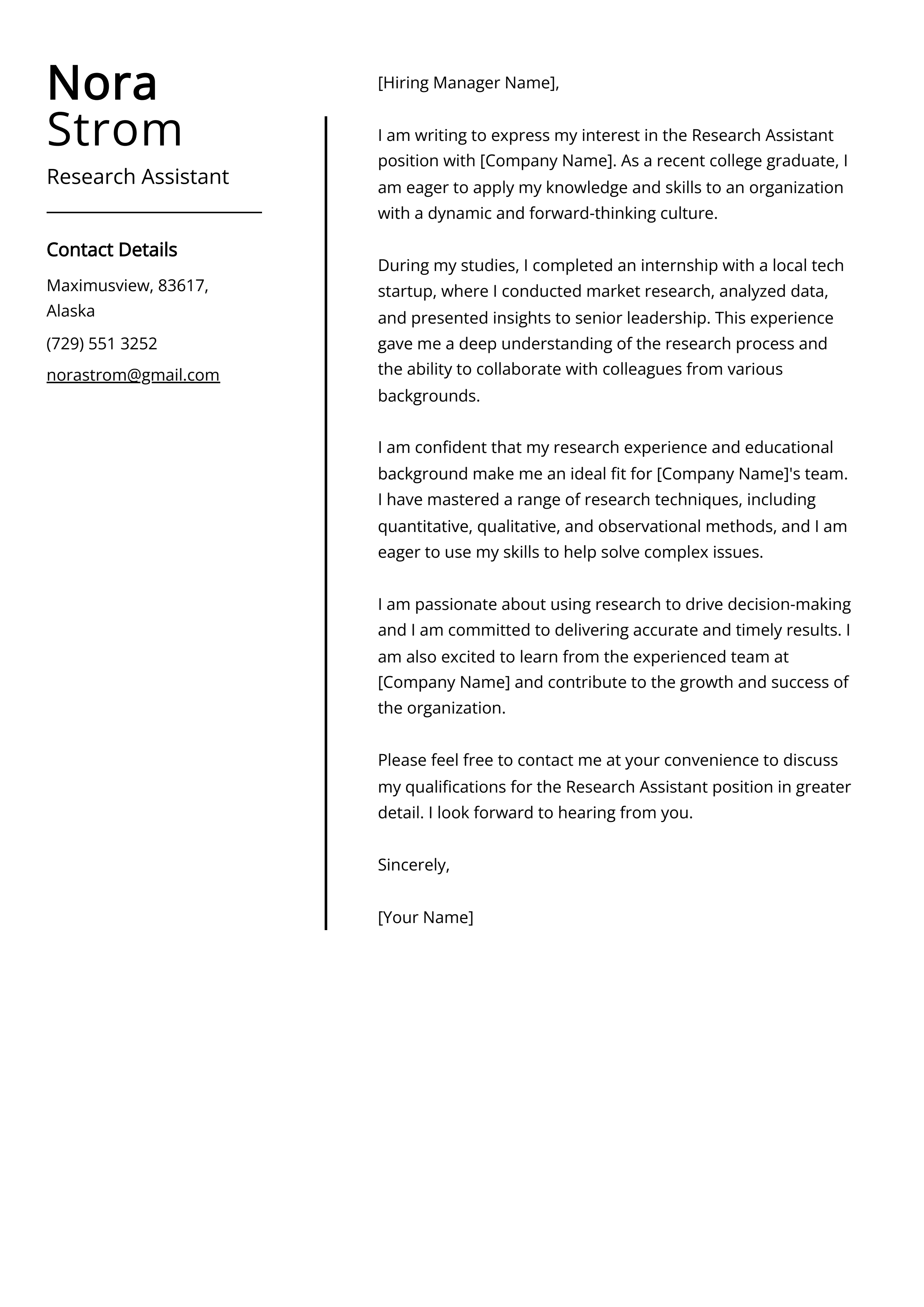
Are you interested in applying for a research assistant position? Writing the perfect cover letter should be at the top of your priority list. Our Research Assistant Cover Letter Guide will provide you with the necessary tips and advice to ensure your cover letter makes an impact and stands out from the competition.
We will cover:
- How to write a cover letter, no matter your industry or job title.
- What to put on a cover letter to stand out.
- The top skills employers from every industry want to see.
- How to build a cover letter fast with our professional Cover Letter Builder .
- What a cover letter template is, and why you should use it.
Related Cover Letter Examples
- Blogger Cover Letter Sample
- Content Producer Cover Letter Sample
- Editor Cover Letter Sample
- News Producer Cover Letter Sample
- News Reporter Cover Letter Sample
- Photojournalist Cover Letter Sample
- Pressman Cover Letter Sample
- Publisher Cover Letter Sample
Research Assistant Cover Letter Sample
- 3D Designer Cover Letter Sample
- Digital Designer Cover Letter Sample
- Junior Designer Cover Letter Sample
- Senior Designer Cover Letter Sample
- Senior Graphic Designer Cover Letter Sample
- Senior Web Designer Cover Letter Sample
- Actor Cover Letter Sample
- Art Director Cover Letter Sample
- Choreographer Cover Letter Sample
- DJ Cover Letter Sample
- Dancer Cover Letter Sample
Dear [Hiring Manager],
I am writing to apply for the position of Research Assistant at [Company Name], as advertised on [Job Posting Website]. With my research experience and ability to work both independently and collaboratively, I am confident that I am the ideal candidate for this role.
I hold a Bachelor’s degree in [Field of Study] and am currently working towards a Master’s degree in [Field of Study] with a focus on [Area of Focus]. During my studies, I have gained the solid foundation of knowledge and technical skills necessary to excel in this role, including data analysis, literature review, and quantitative research.
In my current role as a Research Assistant at [Organization], I have had the opportunity to work on a variety of research projects. I have used qualitative and quantitative research methods to develop research questions, analyze data, and produce meaningful insights. I am also experienced in conducting interviews, writing reports, and presenting research results.
I am an organized and detail-oriented individual with strong problem-solving skills and an ability to think critically. I am also an effective communicator with excellent interpersonal skills, which allows me to work with a diverse range of people. I am comfortable working both independently and as part of a team, and I am confident that I can contribute to the success of your research projects.
I am excited at the prospect of working with [Company Name] and would be delighted to be given the opportunity to do so. I am available for an interview at any time and can be reached at [Phone Number] or [Email Address]. I look forward to hearing from you.
Sincerely, [Your Name]
Why Do you Need a Research Assistant Cover Letter?
Writing a Research Assistant cover letter is an important step in your job search and helps you stand out from other applicants. It showcases your best qualifications and highlights the unique value you can bring to the role. Here are some reasons why you need a Research Assistant cover letter:
- It gives you an opportunity to explain why you are the best candidate for the job.
- It allows you to elaborate on the research experience and skills you have gained to date.
- It shows the employer that you are serious about the job and committed to doing a great job.
- It gives you a chance to showcase your knowledge of the company and the research field you are applying for.
- It helps you to stand out from the competition by highlighting your unique qualifications and experience.
- It allows you to express your enthusiasm for the position and the research field.
A Few Important Rules To Keep In Mind
- Be sure to address your letter to the appropriate person. If a name is not provided, contact the company to determine the hiring manager’s name.
- Open your letter with an enthusiastic and professional salutation.
- Explain why you are writing. Include the position you are applying for and how you heard about it.
- Highlight your qualifications that make you a good fit for the job. Mention specific skills and experience from your background that make you an ideal candidate.
- Make connections between your qualifications and the role. Show how your skills and experience are transferable to the job.
- Close your letter with an expression of appreciation and a call to action.
- Proofread your letter carefully. Have someone else read it as well for a second opinion.
- Include a professional signature at the end of your letter.
What's The Best Structure For Research Assistant Cover Letters?
After creating an impressive Research Assistant resume , the next step is crafting a compelling cover letter to accompany your job applications. It's essential to remember that your cover letter should maintain a formal tone and follow a recommended structure. But what exactly does this structure entail, and what key elements should be included in a Research Assistant cover letter? Let's explore the guidelines and components that will make your cover letter stand out.
Key Components For Research Assistant Cover Letters:
- Your contact information, including the date of writing
- The recipient's details, such as the company's name and the name of the addressee
- A professional greeting or salutation, like "Dear Mr. Levi,"
- An attention-grabbing opening statement to captivate the reader's interest
- A concise paragraph explaining why you are an excellent fit for the role
- Another paragraph highlighting why the position aligns with your career goals and aspirations
- A closing statement that reinforces your enthusiasm and suitability for the role
- A complimentary closing, such as "Regards" or "Sincerely," followed by your name
- An optional postscript (P.S.) to add a brief, impactful note or mention any additional relevant information.
Cover Letter Header
A header in a cover letter should typically include the following information:
- Your Full Name: Begin with your first and last name, written in a clear and legible format.
- Contact Information: Include your phone number, email address, and optionally, your mailing address. Providing multiple methods of contact ensures that the hiring manager can reach you easily.
- Date: Add the date on which you are writing the cover letter. This helps establish the timeline of your application.
It's important to place the header at the top of the cover letter, aligning it to the left or center of the page. This ensures that the reader can quickly identify your contact details and know when the cover letter was written.
Cover Letter Greeting / Salutation
A greeting in a cover letter should contain the following elements:
- Personalized Salutation: Address the hiring manager or the specific recipient of the cover letter by their name. If the name is not mentioned in the job posting or you are unsure about the recipient's name, it's acceptable to use a general salutation such as "Dear Hiring Manager" or "Dear [Company Name] Recruiting Team."
- Professional Tone: Maintain a formal and respectful tone throughout the greeting. Avoid using overly casual language or informal expressions.
- Correct Spelling and Title: Double-check the spelling of the recipient's name and ensure that you use the appropriate title (e.g., Mr., Ms., Dr., or Professor) if applicable. This shows attention to detail and professionalism.
For example, a suitable greeting could be "Dear Ms. Johnson," or "Dear Hiring Manager," depending on the information available. It's important to tailor the greeting to the specific recipient to create a personalized and professional tone for your cover letter.
Cover Letter Introduction
An introduction for a cover letter should capture the reader's attention and provide a brief overview of your background and interest in the position. Here's how an effective introduction should look:
- Opening Statement: Start with a strong opening sentence that immediately grabs the reader's attention. Consider mentioning your enthusiasm for the job opportunity or any specific aspect of the company or organization that sparked your interest.
- Brief Introduction: Provide a concise introduction of yourself and mention the specific position you are applying for. Include any relevant background information, such as your current role, educational background, or notable achievements that are directly related to the position.
- Connection to the Company: Demonstrate your knowledge of the company or organization and establish a connection between your skills and experiences with their mission, values, or industry. Showcasing your understanding and alignment with their goals helps to emphasize your fit for the role.
- Engaging Hook: Consider including a compelling sentence or two that highlights your unique selling points or key qualifications that make you stand out from other candidates. This can be a specific accomplishment, a relevant skill, or an experience that demonstrates your value as a potential employee.
- Transition to the Body: Conclude the introduction by smoothly transitioning to the main body of the cover letter, where you will provide more detailed information about your qualifications, experiences, and how they align with the requirements of the position.
By following these guidelines, your cover letter introduction will make a strong first impression and set the stage for the rest of your application.
Cover Letter Body
Dear Hiring Manager,
I am writing to apply for the position of Research Assistant, as advertised on [insert job board]. With over [insert years] of experience as a Research Assistant, I am confident that I am the ideal candidate for this role.
I have a strong academic background in [insert relevant subject], and have gained extensive experience of conducting research and data analysis in a laboratory setting. I am highly organized and efficient in my approach to research, and have a keen eye for detail. I am also highly motivated and able to work independently, as well as part of a team.
I am particularly experienced in the areas of [insert relevant areas], and have a proven track record of producing accurate and reliable research results. I have excellent communication skills, and am confident in presenting my research findings in a variety of ways. I also have a comprehensive knowledge of [insert relevant software packages], and am able to quickly learn and become proficient in any new software.
I am confident that I can make a valuable contribution to your research team, and am available to discuss my application further in an interview. Please find attached my CV, which contains further details of my qualifications and experience.
I look forward to hearing from you.
Yours sincerely,
[insert name]
Complimentary Close
The conclusion and signature of a cover letter provide a final opportunity to leave a positive impression and invite further action. Here's how the conclusion and signature of a cover letter should look:
- Summary of Interest: In the conclusion paragraph, summarize your interest in the position and reiterate your enthusiasm for the opportunity to contribute to the organization or school. Emphasize the value you can bring to the role and briefly mention your key qualifications or unique selling points.
- Appreciation and Gratitude: Express appreciation for the reader's time and consideration in reviewing your application. Thank them for the opportunity to be considered for the position and acknowledge any additional materials or documents you have included, such as references or a portfolio.
- Call to Action: Conclude the cover letter with a clear call to action. Indicate your availability for an interview or express your interest in discussing the opportunity further. Encourage the reader to contact you to schedule a meeting or provide any additional information they may require.
- Complimentary Closing: Choose a professional and appropriate complimentary closing to end your cover letter, such as "Sincerely," "Best Regards," or "Thank you." Ensure the closing reflects the overall tone and formality of the letter.
- Signature: Below the complimentary closing, leave space for your handwritten signature. Sign your name in ink using a legible and professional style. If you are submitting a digital or typed cover letter, you can simply type your full name.
- Typed Name: Beneath your signature, type your full name in a clear and readable font. This allows for easy identification and ensures clarity in case the handwritten signature is not clear.
Common Mistakes to Avoid When Writing a Research Assistant Cover Letter
When crafting a cover letter, it's essential to present yourself in the best possible light to potential employers. However, there are common mistakes that can hinder your chances of making a strong impression. By being aware of these pitfalls and avoiding them, you can ensure that your cover letter effectively highlights your qualifications and stands out from the competition. In this article, we will explore some of the most common mistakes to avoid when writing a cover letter, providing you with valuable insights and practical tips to help you create a compelling and impactful introduction that captures the attention of hiring managers. Whether you're a seasoned professional or just starting your career journey, understanding these mistakes will greatly enhance your chances of success in the job application process. So, let's dive in and discover how to steer clear of these common missteps and create a standout cover letter that gets you noticed by potential employers.
- Not tailoring the cover letter to the specific position.
- Using a generic salutation such as "To whom it may concern."
- Using overly casual language and slang.
- Making typos and spelling mistakes.
- Failing to proofread the cover letter for errors.
- Stating that you need a job instead of how you can help the employer.
- Failing to demonstrate enthusiasm for the position.
- Including irrelevant information.
- Using overly formal language.
- Failing to provide concrete examples of your skills.
Key Takeaways For a Research Assistant Cover Letter
- Highlight your research experience and skills, including familiarity with academic databases and research methods.
- Showcase your ability to effectively communicate the results of your research.
- Demonstrate your ability to work independently and as part of a team.
- Mention any relevant awards or recognitions you have earned.
- Include any specialized research software that you are proficient with.
- Be sure to proofread your letter for errors and typos.

You control your data
We and our partners use cookies to provide you with our services and, depending on your settings, gather analytics and marketing data. Find more information on our Cookie Policy . Tap "Settings” to set preferences. To accept all cookies, click “Accept”.
Cookie settings
Click on the types of cookies below to learn more about them and customize your experience on our Site. You may freely give, refuse or withdraw your consent. Keep in mind that disabling cookies may affect your experience on the Site. For more information, please visit our Cookies Policy and Privacy Policy .
Choose type of cookies to accept
These cookies allow us to analyze our performance to offer you a better experience of creating resumes and cover letters. Analytics related cookies used on our Site are not used by Us for the purpose of identifying who you are or to send you targeted advertising. For example, we may use cookies/tracking technologies for analytics related purposes to determine the number of visitors to our Site, identify how visitors move around the Site and, in particular, which pages they visit. This allows us to improve our Site and our services.
These cookies give you access to a customized experience of our products. Personalization cookies are also used to deliver content, including ads, relevant to your interests on our Site and third-party sites based on how you interact with our advertisements or content as well as track the content you access (including video viewing). We may also collect password information from you when you log in, as well as computer and/or connection information. During some visits, we may use software tools to measure and collect session information, including page response times, download errors, time spent on certain pages and page interaction information.
These cookies are placed by third-party companies to deliver targeted content based on relevant topics that are of interest to you. And allow you to better interact with social media platforms such as Facebook.
These cookies are essential for the Site's performance and for you to be able to use its features. For example, essential cookies include: cookies dropped to provide the service, maintain your account, provide builder access, payment pages, create IDs for your documents and store your consents.
To see a detailed list of cookies, click here .
This site uses cookies to ensure you get the best experience on our website. To learn more visit our Privacy Policy
- Cover Letter Examples
Research Assistant Cover Letter Samples (Lab, Technician)

Our customers have been hired by:
Ready to concoct the perfect research assistant cover letter? You've got the lab skills and data-crunching expertise, but it's time to prove you're the missing variable in your dream job equation.
Let's design a cover letter that showcases your skills like a finely-tuned experiment, ensuring hiring managers can't resist offering you a spot in their lab.
This research assistant cover letter guide will show you:
- Research assistant cover letter examples better than 9 out of 10 others.
- How to write a perfect researcher cover letter principal investigators love.
- Tips on how to grab their attention with a professional research cover letter.
- How to sell yourself on a cover letter to get the research assistant jobs you want.
Want to write your cover letter fast? Use our cover letter builder. Choose from 20+ professional cover letter templates that match your resume. See actionable examples and get expert tips along the way.
Create your cover letter now
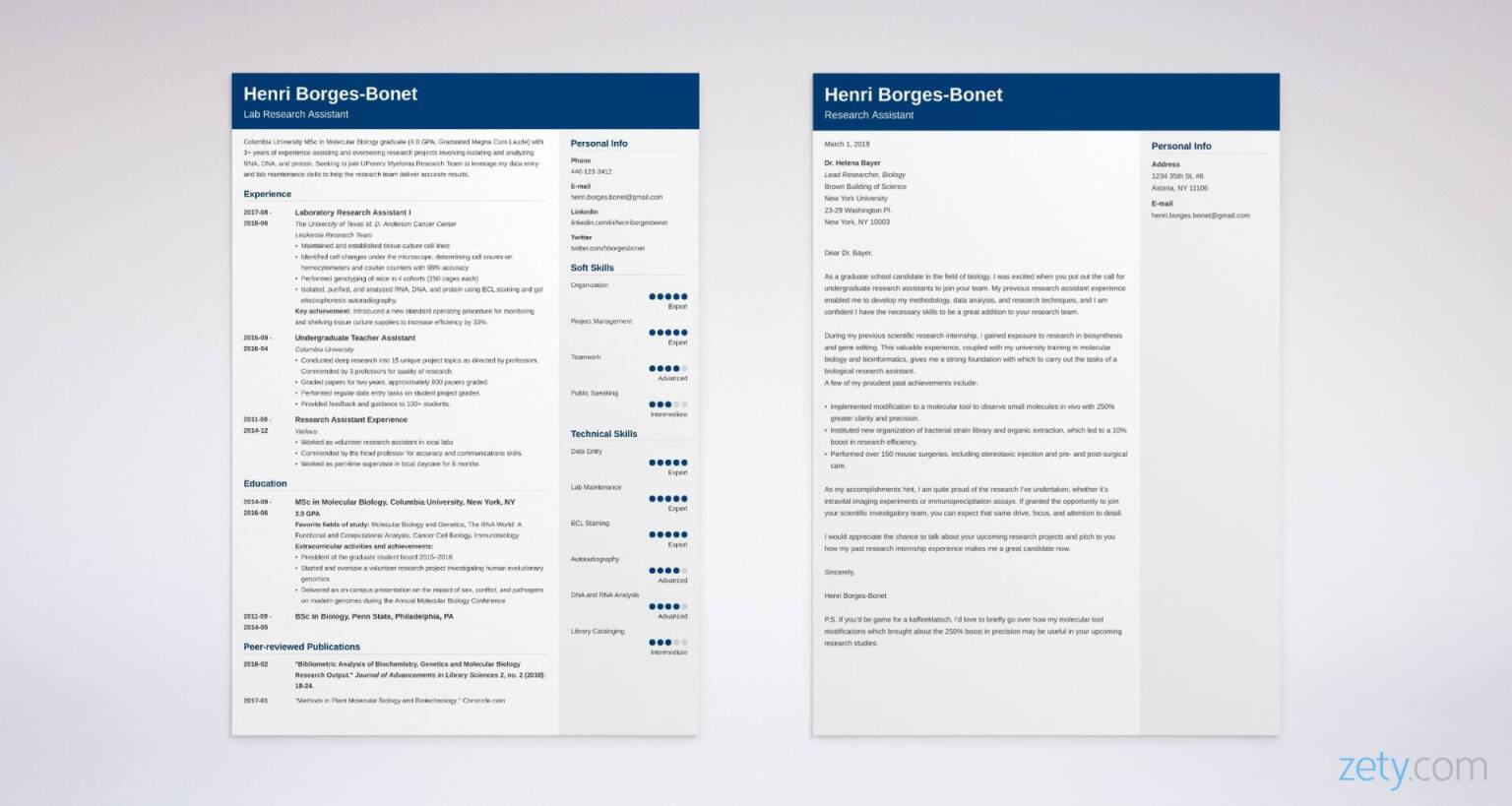
Sample cover letter for a resume— See more cover letter samples and create your cover letter here .
Want to analyze your research assistant resume to be certain all’s in order? Here’s our guide on that: Research Assistant Resume: Sample & Complete Guide.
Considering similar positions too? See other cover letter examples for jobs in your industry:
- Academic Cover Letter Sample
- Graduate Assistantship Cover Letter Sample
- Academic Advisor Cover Letter Sample
- Editorial Assistant Cover Letter Sample
- Admissions Counselor Cover Letter Sample
- Education Cover Letter Sample
- Teacher Cover Letter Sample
- Teaching Assistant Cover Letter Sample
- Lab Technician Cover Letter Sample
- Librarian Cover Letter Sample
- Library Assistant Cover Letter Sample
- Cover Letter for Graduate School Sample
- Cover Letter for Scholarship Application Sample
- Cover Letter for an Architecture Internship Sample
- Cover Letter for Internship Sample
- Postdoc Cover Letter Sample
- Biology Cover Leter Sample
- Psychology Cover Letter Sample
- Formal Cover Letter Sample
- How to Write a Letter of Interest
Want to explore your options further? See our full selection of cover letter examples for every career: Best Cover Letter Examples.
And learn how to keep it short and sweet here: Short Cover Letter Examples for a Speedy Job Application
First, here’s our take on the perfect cover letter for research assistant jobs:
Research Assistant Cover Letter Sample
Henri Borges-Bonet
1234 35th St, #6
Astoria, NY 11106
March 1, 2019
Dr. Helena Bayer
Lead Researcher, Biology
Brown Building of Science
New York University
23-29 Washington Pl.
New York, NY 10003
Dear Dr. Bayer,
As a graduate school candidate in the field of biology, I was excited when you put out the call for undergraduate research assistants to join your team. My previous research assistant experience enabled me to develop my methodology, data analysis, and research techniques, and I am confident I have the necessary skills to be a great addition to your research team.
During my previous scientific research internship, I gained exposure to research in biosynthesis and gene editing. This valuable experience, coupled with my university training in molecular biology and bioinformatics, gives me a strong foundation with which to carry out the tasks of a biological research assistant.
A few of my proudest past achievements include:
- Implemented modification to a molecular tool to observe small molecules in vivo with 250% greater clarity and precision.
- Instituted new organization of bacterial strain library and organic extraction, which led to a 10% boost in research efficiency.
- Performed over 150 mouse surgeries, including stereotaxic injection and pre- and post-surgical care.
As my accomplishments hint, I am quite proud of the research I’ve undertaken, whether it’s intravital imaging experiments or immunoprecipitation assays. If granted the opportunity to join your scientific investigatory team, you can expect that same drive, focus, and attention to detail.
I would appreciate the chance to talk about your upcoming research projects and pitch to you how my past research internship experience makes me a great candidate now.
P.S. If you’d be game for a kaffeeklatsch, I’d love to briefly go over how my molecular tool modifications which brought about the 250% boost in precision may be useful in your upcoming research studies.
How’s that?
Writing research cover letters which would earn you respect from Sheldon Cooper is not as difficult as it sounds (no Bazinga! ). Read on to learn more!
Now, here’s how to write a cover letter for a research assistant position that will get you this job:
Pick the Best Format for a Research Assistant Cover Letter
Before you write a scientific research paper, you need to plan out the layout in an academically and intuitively sensical way.
Same here—
When you write a cover letter for research assistants, use a proper cover letter format to structure everything neatly and orderly.
Here’s a sample cover letter outline to follow like inclusion criteria :
Research Assistant Cover Letter Sample—Format Template
- Your address information and the date of writing
- The contact details of the lead researcher or supervisor
- An opening salutation (e.g., Dear Dr. Bayer, )
- An introduction that grabs their attention from the very beginning
- A paragraph on why you’re the perfect researcher for hire
- A paragraph on why this specific research project is right for you
- A closing paragraph with a powerful call to action
- A complimentary close (e.g., Sincerely ) and your full name
- Optionally, a postscript (P.S.)
Keep your research position application letter to between 200–300 words, depending on your education level and trial experience.
To read more about choosing the best research assistant cover letter components, see this article: What to Include in a Cover Letter?
Start with a Research Assistant Cover Letter Intro They’ll Love
You like research, so here’s a bit for you:
- Clinical research assistants and laboratory technologists are projected to increase by 13% (over 42,000 jobs) between 2016 and 2026 in the US alone.
- Biochemist and biophysicist jobs, including university researchers, are expected to grow by 11% (3,600 jobs) between 2016 and 2026 in the US alone.
- Atmospheric scientists, including meteorologists and climate change researchers, are forecasted to increase by 12% (1,300) jobs between 2016 and 2026 in the US alone.
There’s more where that came from.
Whether you’re a researcher in biology, zoology, psychology, or any other -ology , there’s a lot of academic competition.
Stand out like an Elsevier awards recipient by opening your researcher cover letter the right way.
First, write a salutation which includes their name:
Research Assistant Cover Letters Examples—Salutation
If it’s a formal role, such as in a university, stick to their last name. Don’t forget to acknowledge their professional title, either.
To find the head researcher’s name, check the university, clinical testing, or research facility website. If that doesn’t work, mosey on over to LinkedIn.
Can’t find their name at all?
Don’t worry.
Choose a neutral salutation, such as Dear Lead Researcher . That’s preferred over To whom it may concern .
Don’t care for Dear ? Not able to find the lead researcher’s name? We’ve got other options for various scenarios: How to Start a Cover Letter: Sample & Guide [20+ Examples]
Now, you’re opening lines.
Like a great chemistry researcher, you’ve got all the solutions .
Show them that from the get-go with a compelling introductory statement:
Cover Letter for Research Scientist Jobs Examples—Introduction
The first one is like conducting an experiment without a control group—
You’ll get shot down quick.
The second one, however, shows enthusiasm, confidence you have the required skills, and an alluring peek into your research background and experience.
It’s sure to run benzene rings around the other candidates!
Pro Tip : A generic cover letter is a no-no for any job, but most certainly for the role of a research assistant. Tailor your cover letter by matching your skills and know-how to the specific researcher responsibilities and requirements.
There are other ways to go about your research technician cover letter introduction statement. For more ideas, see: How to Write a Cover Letter: Sample & Guide [20+ Examples]
Write a Great Middle for Your Cover Letter for Research Assistants or Internships
The core. The body paragraphs. The nucleus.
However you refer to it, these middle bits are crucial to get right on a research assistant cover letter.
Don’t, and the only adverse events you’ll be a part of will involve your professional career.
Use 2–3 paragraphs to include these key research assistant cover letter necessities:
- Explain why you’re the best research assistant candidate.
- Give numbered accomplishments to verify proud past wins.
- Demonstrate the research skills you have match their requirements.
- Make it evident this is the research job of your dreams.
Here’s a sample biological research cover letter sample body:
Cover Letter for Research Position Undergraduate Example—Body
During my previous scientific research internship, I gained exposure to research in biosynthesis and gene editing. This experience, coupled with my university training in molecular biology and bioinformatics, gives me a strong foundation with which to carry out the tasks of the biological research assistant.
As my accomplishments hint, I am quite proud of the research I’ve undertaken, whether it’s intravital imaging experiments or immunoprecipitation assays. If granted the opportunity to join your research team, you can expect that same drive, focus, and attention to detail.
Well, what do you think?
This body section for a research assistant cover letter is only three paragraphs long.
However, it packs a punch by stuffing it with just the essentials: quantifiable achievements, insight into your research background, and a show of desire to join the team—no filler or fluff.
Strong as a covalent bond!
Pro Tip : Use keywords on your cover letter for research assistants, just as you used on your research assistant resume. Choose the best fonts to make it easy for research fellows and lead investigators to read.
Need more ideas on how to tweak the body area? Maybe research assistant cover letter no experience examples? We’ve got all the cover letter dos and don’ts here: 35+ Professional Cover Letter Tips and Advice
Close Your Research Assistant Cover Letter Like a Successful Debrief
Most behavioral science studies require a signed post-debrief consent form for each participant to properly close them out.
It’s similar here—
Whether it’s a clinical research coordinator cover letter or an entry-level research internship cover letter , end it right with a solid closing statement.
Here are two examples of research assistant cover letter endings:
Cover Letter for Undergraduate Research Assistant Examples—Closing Paragraph
The first one is curt and emotionless—
It puts the ass in research assistant .
The second one, though, neatly ties the rest of the cover letter together.
Pure efficacy .
Next—
A valediction (closing sentiment) and your full name:
Sample Cover Letter Research Assistant—Valediction
Lastly, the postscript.
While a P.S. below your signature isn’t required, it’s a great hack to grab the principal investigator’s attention once more.
Here’s an example P.S. for a clinical research assistant cover letter:
Research Assistant Cover Letter Sample—Postscript
P.S. If you’d be game for a kaffeeklatsch, I’d love to briefly go over how molecular tool modifications which brought about the 250% boost in clarity may be useful in your upcoming research studies.
This postscript adds some humanity to any sociological research or clinical research cover letter.
It also reminds them of your greatness by bringing up a key win once again.
Now, you’re a strong contender for the research position!
Pro Tip : Writing a cover letter for research internships or one with no experience? Follow the same instructions here, but tweaked and tailored to your role. On an entry-level or research assistant internship cover letter, study the job description and highlight transferable skills.
Looking for more ideas on how to close out a research cover letter? We’ve a great guide right here: How to End a Cover Letter: Sample & Complete Guide [+20 Examples]
When making a resume in our builder, drag & drop bullet points, skills, and auto-fill the boring stuff. Spell check? Check . Start building a professional resume template here for free .

When you’re done, our easy resume builder will score your resume and our resume checker will tell you exactly how to make it better.
Key Takeaway
Now you have an research assistant cover letter that deserves a Humboldt Prize, and it’s nowhere near as arduous as a longitudinal clinical trial.
Let’s wrap it up.
Here’s how to write the perfect cover letter for research assistant jobs:
- Format your RA or CRA cover letter so that it’s accessible and logical.
- Open with a compelling intro statement for a good head start.
- Summarize your background and experience in a relevant manner.
- Highlight a few past accomplishments using numbers.
- Show your enthusiasm for the project, research topic, and investigator.
- Close it off with a powerful ending statement and call to action
- Consider adding a postscript for one last chance to wow them.
Now THAT’S a research assistant cover letter hot enough to denature any protein!
Have any questions on how to write a cover letter for clinical research or institutional studies? Not sure how to talk up your investigative skills, research abilities, or scientific achievements? Get at us in the comments below, and we’ll answer your questions. Thanks for reading!
About Zety’s Editorial Process
This article has been reviewed by our editorial team to make sure it follows Zety's editorial guidelines . We’re committed to sharing our expertise and giving you trustworthy career advice tailored to your needs. High-quality content is what brings over 40 million readers to our site every year. But we don't stop there. Our team conducts original research to understand the job market better, and we pride ourselves on being quoted by top universities and prime media outlets from around the world.
- https://www.bls.gov/ooh/life-physical-and-social-science/biochemists-and-biophysicists.htm
- https://www.bls.gov/ooh/life-physical-and-social-science/atmospheric-scientists-including-meteorologists.htm

Don't miss out on exclusive stories that will supercharge your career!
Get a weekly dose of inspiration delivered to your inbox
Similar articles

How to Explain Gaps in Employment (Resume & Cover Letter)
An employment gap is a period of time (months of years) when a job seeker didn't have a job. While out of work, employees use their time to have children, travel or go to school full time.

How to Write an Entry-Level Cover Letter + Examples
No experience? No problem! See a sample entry-level cover letter and a first job cover letter template that will help you get the job you're after!

Science Cover Letter: Examples & Writing Tips for Scientists
Whether you’re a psychologist, environmental scientist, biochemist, or epidemiologist, you need a science cover letter that shows you can get the job done. See how, below.
Research Assistant Cover Letter

About this sample
This Research Assistant cover letter is a professional document that is used to introduce yourself to a potential employer and highlight your skills and experience in the field of research. This template is optimized to get interviews by clearly outlining your relevant qualifications and showcasing your ability to assist researchers and support their work . With skills such as attention to detail, problem-solving, and organization , you can demonstrate your ability to handle the demands of a research assistant position and showcase your potential as a valuable employee. By using this template, you can help your cover letter stand out from other applicants and increase your chances of getting an interview.
Here's how Rezi AI Cover Letter Writer works
Create a resume with a targeted job description.

Enter the highlighted details of the cover letter

Click "AI Writer Ready"



Sign up to our Newsletter
Crafting an effective research assistant cover letter + examples.

Reviewed by:
Akhil Katakam
Third-Year Medical Student, Lewis Katz School of Medicine at Temple University
Reviewed: 1/8/24
Are you looking to land a research assistant position? Keep reading to learn how to craft a standout cover letter for a research assistant role.
Your medical research assistant cover letter is the first impression you make on potential employers, and it can significantly influence their decision to consider you for the role. While your resume provides the facts, your cover letter adds the personal touch, helping you stand out and demonstrate your enthusiasm and suitability for the position.
In this article, we'll break down the importance of your cover letter in your application for research assistant positions and show you how it can be a game-changer in landing that perfect job.
Get The Ultimate Guide on Writing an Unforgettable Personal Statement

Why Do You Need a Research Assistant Cover Letter
Let's dive into why a well-crafted research assistant cover letter is vital for your academic and research job applications.
First Impressions Matter
Your cover letter is your initial handshake with potential employers. It's their first impression of you and carries significant weight. A strong opening paragraph can help grab their attention and set a positive tone.
Customization is Key
Each research assistant job is unique, and your cover letter should reflect that. It's your tool to demonstrate that you're the ideal fit for the specific position you're applying for by emphasizing matching skills and experiences.
Show Genuine Enthusiasm
Beyond qualifications, your cover letter allows you to express your real interest in the research assistant role and the organization. It's your chance to convey your excitement and alignment with their mission and values.
Highlight Soft Skills
While resumes focus on hard skills, your cover letter spotlights essential soft skills like teamwork and communication, crucial in research. Provide examples of your effective use of these skills.
Explain Your Story
Your career journey may have unique aspects or gaps. Use your cover letter to provide context and help employers understand your professional journey.
Writing Abilities
Many research roles require strong writing skills. Your cover letter serves as a writing sample to showcase your ability to communicate ideas clearly. Working on your writing skills will also help down the line when you write a personal statement for medical school.
In a competitive job market, a well-crafted cover letter sets you apart, signaling your commitment to making a strong impression.

How to Write an Effective Cover Letter?
Writing a strong cover letter is important when applying for jobs. In this section, we'll look at the key elements and tips for creating a cover letter that stands out and increases your chances of getting the job you want.
Address the Recipient
Begin with a courteous salutation, such as "Dear Hiring Manager" or "To the Research Team." If you have information about the hiring manager's name, use it for a more personalized touch.
Introduction
Open with enthusiasm for the medical research assistant position. Mention where you learned about the job, such as through a job board or a referral, and briefly state why you're excited about the opportunity to contribute to medical research.
Customize for the Job
Ensure your cover letter is specific to the medical research assistant role and the healthcare institution you're applying to. Mention the position title and the organization's name to demonstrate your genuine interest.
For example, if you’re applying for a position with a pharmacist , mention the position title and the healthcare institution's name, such as "Pharmacy Research Assistant at XYZ Medical Center." This personalized approach shows that you've done your research and are genuinely enthusiastic about the role, making a strong impression on potential employers.
Highlight Your Qualifications
In the main section, emphasize qualifications and skills relevant to medical research. Provide concrete examples of your experience in data collection, lab techniques, patient interactions, or any other applicable areas.
Show Cultural Fit
Explain how your values align with those of the healthcare institution or research team. Highlight your dedication to ethical research practices and commitment to advancing medical knowledge.
Soft Skills and Achievements
Discuss soft skills crucial for medical research, such as attention to detail, teamwork, and adherence to protocols. Share accomplishments, like successful research projects or contributions to scientific publications.
Explain Career Gaps or Changes
If your career path includes gaps or transitions, use the cover letter to address these. Explain how these experiences have enriched your skills and prepared you for the role of a medical research assistant.
Express Enthusiasm and Confidence
Conclude with a confident statement of your eagerness to join the research team and contribute to medical discoveries. Reiterate your belief that your qualifications make you an ideal candidate.
Call to Action
In your closing paragraph, politely request an interview to discuss your qualifications in more detail. Express your availability for further discussions.
Formal Closing
Sign off with a formal closing, such as "Sincerely" or "Best Regards," followed by your full name.
Proofread and Edit
Thoroughly proofread your cover letter to eliminate any spelling or grammar errors. Ensure it's well-structured and concise. If possible, have a trusted colleague or mentor review it for feedback.
Format and Length
Keep your cover letter to one page, maintaining a professional and organized format. Use a standard font and formatting style for clarity.
Include Contact Information
Place your contact details, including your phone number and email, at the top of the cover letter for easy reference.
Attach or Send with Resume
When applying online, attach your cover letter and resume as separate documents. If sending via email, include both as attachments or in the email body, as per the employer's instructions.
After submitting your application, consider sending a polite follow-up email within a reasonable timeframe to inquire about the status of your application. This demonstrates your continued interest in the position.
Writing an effective cover letter doesn't have to be complicated. It's all about introducing yourself, explaining why you're a great fit for the job, and showing your enthusiasm.
Customizing it for each job application is key, as it demonstrates your interest and effort. With these steps, you'll be on your way to creating a compelling cover letter that impresses potential employers.
Preparing an Undergraduate Research Assistant Cover Letter
Creating an effective undergraduate research assistant cover letter hinges on identifying key terms, qualifications, and responsibilities in the job description. Here's why it's crucial:
- Customization : Tailoring your cover letter demonstrates your genuine interest. Identifying key terms allows you to align your qualifications with the job's needs.
- Relevance : Including relevant keywords helps your cover letter navigate applicant tracking systems (ATS), which screen for a match with the job's requirements.
- Highlighting Fit : Addressing qualifications and responsibilities shows how you're a strong fit. It makes it easier for employers to see your potential as a research assistant.
- Attention to Detail : Paying close attention and incorporating job description elements demonstrates your attention to detail and ability to follow instructions—qualities highly valued in research roles.
Remember, it's not just about identifying key terms; you should also provide evidence of how you meet these qualifications to stand out in the application process.

How to Format Your Letter Properly?
Formatting your research assistant cover letter properly is crucial to creating a professional and appealing document. Here's a step-by-step guide on how to format it correctly:
- Contact Information : Place your contact information at the top of the letter. Include your full name, phone number, email address, and LinkedIn profile (if applicable). Center-align this section for a clean look.
- Date : Include the current date below your contact information.
- Employer's Contact Information : Beneath the date, include the recipient's details. Mention the employer's name, title, company or institution name, and their address. If you don't have a specific name, use a general salutation like "Dear Hiring Manager."
- Salutation : Greet the recipient with a polite salutation. If you know the recipient's name, use it (e.g., "Dear Mr. Smith"). If not, "Dear Hiring Manager" is acceptable.
- Opening Paragraph : Begin with a strong and engaging opening that explains your intent. Mention the position you're applying for and how you learned about it.
- Body Paragraphs : Use two or three body paragraphs to highlight your qualifications, skills, and experiences. Tailor your content to match the specific requirements of the research assistant role. Provide examples of relevant projects or research you've been involved in and how they relate to the position.
- Closing Paragraph : Summarize your interest in the position and briefly reiterate your qualifications. Express enthusiasm for the opportunity to discuss your application further.
- Complimentary Close : Choose a professional closing such as "Sincerely" or "Yours faithfully."
- Signature : Leave space for your handwritten signature above your typed name.
- Enclosures : If you're including additional documents, like your resume or academic transcripts, mention them in this section.
- Postscript (Optional) : You can include a postscript (P.S.) beneath your signature for an extra note, but make sure it's relevant and adds value.
- Formatting and Style :
- Use a professional font (e.g., Arial, Times New Roman) and keep the font size between 10 and 12 points.
- Ensure consistent formatting, alignment, and spacing throughout the letter.Use standard margins (usually 1-inch) and left-align your text.
- Keep the cover letter concise, typically one page in length.
- Proofread your letter carefully to eliminate any typos or grammatical errors.
- File Format: Save your cover letter as a PDF file to ensure that the formatting remains intact when the employer opens it.
Remember that a well-formatted cover letter not only makes a good first impression but also demonstrates your attention to detail and professionalism. Tailor each cover letter to the specific job you're applying for to increase your chances of success.
Strategies for Getting a Research Assistant Role
Whether you’re applying in your freshman year or before medical school —securing a research assistant role can be competitive.
Keep reading for some effective strategies that will boost your chances of success. Let's get into the approaches that will help you land the research assistant position you're aiming for.
Emailing Your Cover Letter and Resume
- Use a Professional Email : It's essential to use a professional-sounding email address for job applications. If your current email is informal or unprofessional, consider creating a new one that includes your name, like "[email protected]."
- Clear Subject Line : Create a subject line that clearly states the purpose of your email. For example, "Application for Research Assistant Position - [Your Name]."
- Introductory Email : Write a concise, engaging email to accompany your attachments. Start by introducing yourself and mentioning the specific job you're applying for. Express your genuine interest in the position and briefly explain why you're a strong candidate. Also, include where you found the job listing (e.g., on the company's website or a job board).
- Attach PDFs: Save your resume and cover letter as PDF files. PDFs ensure that your formatting remains intact and that the documents are easily accessible across different devices. Give your files clear names, such as "YourName_Resume.pdf" and "YourName_CoverLetter.pdf." Mention in your email that you have attached these files for their reference.
Sending a Follow-up Email
- Timing Matters : After you've submitted your application, try to be patient. Wait about one to two weeks before sending a follow-up email. This allows the hiring team sufficient time to review applications and make initial selections.
- Polite Tone : Craft your follow-up email with a polite and professional tone. Express your continued interest in the position and inquire about the status of your application. Use courteous language, and remember that the hiring process may take time.
- Show Gratitude : Regardless of whether you've received a response, always thank the recipient for considering your application. Express your appreciation for the opportunity to apply and your enthusiasm for the role. This courtesy demonstrates your professionalism and gratitude for their time.
By following these steps, you'll effectively navigate the process of emailing your cover letter and resume and sending a follow-up email in a professional and considerate manner.
Common Mistakes to Avoid
Securing a research assistant role is an exciting opportunity, but avoiding these common cover letter mistakes is crucial for success:
- Generic Approach : Tailor each cover letter to the specific job and organization, showcasing how your skills align with their goals.
- Overemphasizing Education : Balance your academic qualifications with practical skills and real-world experiences to create a well-rounded pre-med resume.
- Neglecting Research : Understand the prospective employer's values and projects. Mention what resonates with you and why you want to join their team.
- Ignoring Requirements : Address job posting requirements explicitly with examples from your experiences.
- Being Long-Winded : Keep your cover letter concise, focusing on relevant qualifications and experiences.
- Forgetting to Proofread: Thoroughly proofread for typos, grammar, and formatting issues to reflect professionalism.
- Lacking Enthusiasm: Convey genuine enthusiasm for the role and organization, explaining why you're excited about the opportunity.
- Not Following Instructions: Adhere to submission guidelines precisely to demonstrate your ability to follow directions.
By avoiding these mistakes and crafting a well-tailored, concise cover letter, you'll enhance your chances of securing that coveted research assistant role.

Research Assistant Cover Letter Examples
Take a look at these research assistant cover letter examples to get practical guidance on creating an effective cover letter that will make a positive impression on prospective employers.
"Yaretzi Townsend
City, State, Zip Code
Home : 000-000-0000 Cell: 000-000-0000
Dear Professor Saro-Wiwa,
I am very interested in the medical research assistant position in the immunization department at Queensborough Medical. The focus of my career has been immunology and genetics, and I have followed your work in this field since I began operating professionally in the field six years ago. I believe my experiences and diligence in medical research would be beneficial to all your projects.
With a degree in Medical Biochemistry, I have laboratory experience in conducting cell culture assays, processing blood samples, analyzing DNA sequences, performing polymerase chain reactions, protein purification spectrophotometry, and electrophoresis. I am also quite adept at performing statistical analysis using bioinformatics and documenting experiment results and sample details.
I have prepared pro forma reports for other specialists and pathology labs. In my work as a medical research assistant, I have a reputation for conducting highly received seminars and presentations in immunology and the latest developments and expectations in the field. In fact, you may recall attending one in 2006 at Alton Hall for the Students’ Chemistry Society in Tennessee.
As you have already noted, I am experienced and enthused about being a medical research assistant. But, my resume cannot express how excited I am about being a part of your institute. Only a person-to-person interview can do that.
Best Regards,
Yaretzi Townsend"
"Dear Dr. Johnson,
I am writing to express my enthusiastic interest in the Medical Research Assistant position at NeuroTech Solutions, as posted on your company's website. With a solid educational background in neuroscience and a strong commitment to unraveling the complexities of neurodegenerative diseases, I am eager to contribute my expertise to your esteemed research team.
My academic journey at Columbia University has equipped me with a robust knowledge base in neuroscience, including comprehensive coursework in neurobiology and cutting-edge neuroimaging techniques. Furthermore, I have had the privilege of participating in research projects like "Neuroscience and Aging," where I conducted in-depth investigations into the effects of aging on brain function, utilizing functional MRI scans. These experiences have significantly bolstered my proficiency in neuroimaging and enhanced my ability to conduct autonomous research effectively.
One standout project that exemplifies my skills is my involvement in the "NeuroAge Study" at NeuroTech Solutions. Here, I conducted intricate neuroimaging analyses, focusing on examining functional connectivity changes in the aging brain. My findings not only contributed to valuable insights but also led to the publication of a research paper in the esteemed "Journal of Neuroscience," underlining my capacity to make meaningful contributions to the field.
What captivates me about NeuroTech Solutions is the organization's unwavering dedication to advancing research in neurodegenerative diseases, particularly evident in your groundbreaking "NeuroScienceCare" project. I am particularly drawn to this initiative and am excited about the prospect of lending my neuroimaging and data analysis skills to further its success.
Throughout my academic journey and my prior role as a research intern at NeuroTech Solutions, I have honed my expertise in experimental design, data collection, and meticulous analysis, all of which I believe are indispensable for the seamless execution of research endeavors.
The prospect of joining NeuroTech Solutions and collaborating with esteemed researchers to advance our understanding of neurodegenerative diseases fills me with excitement. I have enclosed my resume for your reference, providing a more comprehensive overview of my academic background and research experiences. I would greatly appreciate the opportunity to discuss how my qualifications align with your specific requirements in further detail.
Thank you for considering my application. I am eagerly looking forward to the chance to contribute my passion for neuroscience research and my unwavering dedication to the exploration of neurodegenerative diseases to your dynamic team. Please feel free to contact me at (416) 546-6542 or via email at [email protected] to arrange an interview.
Karan Singh"
“Dear Dr. Wahi,
I am writing to express my strong interest in the Research Assistant position at Stanford University, as advertised on your university's careers page. With a solid foundation in molecular biology and a passion for genomics research, I am eager to contribute my expertise to your esteemed research team.
During my academic journey at Harvard University, I had the privilege of working on several research projects that equipped me with hands-on experience in genome sequencing and analysis. One project that showcases my skills is the "Genome Mapping Initiative." In this initiative, I sequenced and analyzed genomic data from various species, including a challenging project involving the genome of an endangered bird species. My contributions significantly improved data accuracy and contributed to the publication of two research papers.
What excites me about the Research Assistant role at Stanford University is the opportunity to collaborate with renowned researchers in genomics, including your ongoing "Genome Diversity Project." One specific aspect of this project that resonates with me is your exploration of genetic variations in underrepresented populations. My previous experience in genome sequencing, particularly with non-model organisms, aligns perfectly with this initiative, and I am eager to contribute my expertise.
In addition to my technical abilities, I am highly organized and detail-oriented. As a laboratory assistant at Harvard University, I managed laboratory resources efficiently and ensured accurate record-keeping. These skills are essential for managing the complexities of genomics research effectively.
I am excited about the prospect of joining Stanford University and contributing to its cutting-edge genomics research efforts. Enclosed, please find my resume, which provides further details about my academic background and research experience. I look forward to the opportunity to discuss how my qualifications align with your needs in more detail.
Thank you for considering my application. I am eager to bring my passion for genomics research and my dedication to advancing the field to your team. Please feel free to contact me at (647) 203-4577 or [email protected] to schedule an interview.
Lisa Nguyen
These examples feature strong cover letters. The applicants express their genuine interest in the job, highlight their qualifications, and show their familiarity with the research field or company. The letters are well-structured, providing clear details about their past experiences and contributions, making a compelling case for their abilities.
Throughout the letters, their enthusiasm for the job shines, and they conclude by expressing eagerness for an interview, leaving a straightforward impression that they're a good match for the positions they seek.
Cover Letter Template
Below, you'll find a cover letter template for a research assistant role tailored to help you craft a compelling cover letter.
[Your Name]
[Email Address]
[Phone Number]
Dear Hiring Manager,
It’s my pleasure to be applying to the position of Research Assistant with Seaside University, which I saw advertised on Resume.com. I'm particularly interested in sustainability and environmentalism and I know that this is one of your main focus areas. I'm confident that my education, previous work experience, and personal interests would make me a great asset to your research team.
For the past 2 years, I've been working as a Research Assistant for East Coast University. My responsibilities include coordinating the schedules of research participants, compiling data, and presenting it in reports.
As I performed my job duties, I realized that our data collection system wasn't very streamlined. I suggested some modifications to my team, and my ideas were well received. After implementation, my suggested changes enabled us to improve both the accuracy and the efficiency of the data collection process by 50% over our previous method.
Over the 2 years I've been in my current role, I've discovered that my favorite part of the job is developing data collection and reporting processes. I find data manipulation to be fascinating as well. At this point in my career, I'm looking for a role that enables me to be part of a project that I am deeply passionate about. This is why I'm so drawn to your organization. I would love to play a part in researching sustainability to make our planet healthier for the generations to come.
I really appreciate you taking the time to review my application, and I hope to speak with you soon regarding an interview. I have no doubt that my attention to detail, analytical thinking skills, and commitment to environmentalism and sustainability will make me a valuable and dedicated member of your team!
Keep reading for quick answers to common questions about crafting your research assistant cover letter effectively.
1. How to Write a Cover Letter for a Research Assistant With No Experience?
If you're new to research assistant roles, focus on your relevant coursework, academic achievements, and transferable skills in your cover letter. Highlight your passion for research and eagerness to learn.
2. Why Is a Cover Letter Essential for a Research Assistant Application?
A cover letter introduces you to potential employers, showcases your qualifications, and demonstrates your enthusiasm for the role and organization. It's your chance to make a strong first impression.
3. What Should I Do if I Lack Prior Research Assistant Experience?
If you don't have research assistant experience, emphasize your academic background, coursework, and any relevant projects or lab work. Highlight transferable skills like attention to detail and analytical thinking.
4. Is It Important to Customize My Cover Letter for Each Research Assistant Position?
Yes, customizing your cover letter for each job is crucial. It shows your genuine interest and how well you match the specific job's requirements and the organization's culture.
5. How Can I Address the Hiring Manager in My Research Assistant Cover Letter?
Whenever possible, address the hiring manager by name. If the name isn't provided in the job posting, try to find it through research or use a generic salutation like "Dear Hiring Manager."
6. What Information Should I Include in My Cover Letter?
Your cover letter should include an introductory paragraph, a section highlighting your qualifications, a section explaining your interest in the position and organization, and a closing paragraph expressing your eagerness and willingness to discuss further in an interview.
Final Thoughts
To sum it up, your cover letter for a research assistant is indispensable. It acts as your initial introduction and provides an avenue to showcase your abilities, passion, and alignment with the role and institution.
A carefully composed cover letter can unlock doors to exciting opportunities in the field of medical research during your undergraduate years, setting you on a path for career growth. So, prepare to make a lasting impression and secure that coveted research assistant position.
Schedule A Free Consultation
You may also like.

How To Write A Letter of Recommendation for Yourself

The Best Hobbies for Your Medical School Application

1 Research Assistant Cover Letter Example
Research Assistants meticulously gather, analyze, and interpret data to contribute to knowledge and innovation. Similarly, your cover letter is your chance to compile your skills, experiences, and achievements into a persuasive narrative that demonstrates your value. In this guide, we'll delve into the best cover letter examples for Research Assistants, helping you to craft a compelling story that showcases your analytical prowess and dedication to discovery.

Cover Letter Examples
Cover letter guidelines, research assistant cover letter example, how to format a research assistant cover letter, cover letter header, what to focus on with your cover letter header:, cover letter header examples for research assistant, cover letter greeting, get your cover letter greeting right:, cover letter greeting examples for research assistant, cover letter introduction, what to focus on with your cover letter intro:, cover letter intro examples for research assistant, cover letter body, what to focus on with your cover letter body:, cover letter body examples for research assistant, cover letter closing, what to focus on with your cover letter closing:, cover letter closing paragraph examples for research assistant, pair your cover letter with a foundational resume, cover letter writing tips for research assistants, highlight relevant skills and experience, articulate your research interests, showcase your critical thinking and problem-solving abilities, demonstrate attention to detail, convey your ability to work collaboratively, cover letter mistakes to avoid as a research assistant, lack of specificity, ignoring the fit with the research team, overlooking soft skills, excessive length and lack of clarity, failure to proofread, cover letter faqs for research assistants.
The best way to start a Research Assistant cover letter is with a strong opening that captures the reader's attention. Begin by addressing the letter to a specific person, if possible. Then, concisely express your enthusiasm for the research field or project and highlight a key qualification that aligns with the job requirements. For example: "Dear Dr. Smith, I am excited to apply for the Research Assistant position with XYZ Lab, renowned for its groundbreaking work in neurobiology. My hands-on experience with advanced microscopy techniques during my undergraduate thesis makes me a strong fit for your team." This approach shows you've done your homework and immediately presents you as a relevant candidate.
Research Assistants should end a cover letter by summarizing their interest in the position and expressing enthusiasm for the opportunity to contribute to the research team. They should reiterate their relevant skills and experiences, and how these align with the job requirements. It's also important to thank the hiring manager for their time and consideration. For example: "I am excited about the opportunity to contribute my research and analytical skills to your team. Thank you for considering my application. I look forward to the possibility of discussing my candidacy further." Finally, they should sign off professionally with "Sincerely" or "Best regards," followed by their full name.
A Research Assistant's cover letter should ideally be about one page long. This length is sufficient to introduce yourself, express your interest in the position, detail your relevant skills and experiences, and conclude with a strong closing statement. It's important to keep it concise and to the point, as hiring managers often have many applications to go through. A one-page cover letter ensures that your key points are not lost in a sea of text, and it shows that you can effectively communicate important information in a concise manner, which is a valuable skill in research.
Writing a cover letter with no experience as a Research Assistant can seem daunting, but it's important to remember that everyone starts somewhere. Here's how you can approach it: 1. Start with a strong introduction: Begin your cover letter by introducing yourself and expressing your interest in the position. Mention where you saw the job posting and why you're interested in the role. 2. Highlight relevant skills: Even if you don't have direct experience as a Research Assistant, you likely have skills that are relevant to the role. These could include data analysis, critical thinking, problem-solving, attention to detail, and communication skills. Use your cover letter to highlight these skills and provide examples of how you've used them in the past. 3. Discuss relevant coursework or academic projects: If you're a student or recent graduate, you can discuss coursework or academic projects that are relevant to the role. This could include research projects, lab work, or classes related to the field you're applying to. 4. Show enthusiasm for the field: Research Assistants are often hired in specific fields of study. Show your enthusiasm for this field in your cover letter. This could include discussing relevant books you've read, lectures you've attended, or why you're interested in the field. 5. Conclude with a strong closing: In your closing paragraph, reiterate your interest in the role and your eagerness to contribute to the team. Thank the hiring manager for considering your application and express your hope for the opportunity to further discuss your qualifications. 6. Proofread: Finally, make sure to proofread your cover letter for any spelling or grammar mistakes. A well-written, error-free cover letter shows your attention to detail and professionalism. Remember, the goal of your cover letter is to show the hiring manager why you would be a good fit for the role, even if you don't have direct experience. Use it as an opportunity to showcase your skills, enthusiasm, and potential.
Related Cover Letters for Research Assistants
Research and development manager cover letter.

UX Researcher Cover Letter

Equity Research Cover Letter
Research Scientist Cover Letter

Data Analyst Cover Letter

Virtual Assistant Cover Letter

Research Assistant Cover Letter

Related Resumes for Research Assistants
Research assistant resume example.

Try our AI-Powered Resume Builder
This site uses cookies to ensure you get the best experience on our website. To learn more visit our Privacy Policy
Research Assistant Cover Letter: Examples & Templates (2024)
I had an interview yesterday and the first thing they said on the phone was: “Wow! I love your cover letter.” Patrick I love the variety of templates. Good job guys, keep up the good work! Dylan My previous cover letter was really weak and I used to spend hours adjusting it in Word. Now, I can introduce any changes within minutes. Absolutely wonderful! George
1. Research Assistant Cover Letter Examples
Example #1: research assistant candidate, example #2: research assistant cover letter no experience, 2. how to write a cover letter for research assistant jobs step by step (template), 1. format your research assistant cover letter in an organised way, 2. list your contact information in the research assistant cover letter header, research assistant cover letter header template, 3. introduce yourself and what position you’re applying to, research assistant cover letter sample: introduction, 4. showcase your relevant strengths, research assistant cover letter: middle paragraph, 5. tell them why they’re special, research assistant cover letter example: your motivation, 6. finish with a clear call to action and a proper sign-off, sample cover letter for a research assistant: call to action & formal closing, about resumelab’s editorial approach, was it interesting here are similar articles.

Cover Letter for Scholarship: Examples & Templates to Fill

How to Address a Cover Letter—20+ Examples & 3 Easy Steps

How to Write a General Cover Letter That’s Not Generic
- Cover Letter Examples
Research Assistant Cover Letter: Sample & How to Write

Our customers were hired by:
Whether you’re performing experiments in the lab, gathering anthropological data or seeing how many open browser tabs your computer will tolerate before going critical, being a research assistant offers you more variety and intellectual engagement than many other jobs. ‘Interesting’ doesn’t begin to cover it.
At least, it can be that good. But the work of a research assistant can also be a dreary blur of all-nighters spent hunched over a laptop and days spent following the same experimental protocols over and over again, until n is sufficiently large to say something conclusive about whatever it is you’re studying.
This article is here to help you steer into a work life that gives you wings without crushing your own academic work or personal life. With plenty of cover letter samples for research assistant jobs, you’ll learn by example as much as exposition how to write your most effective research assistant cover letter ever.
Use the LiveCareer cover letter builder and your cover letter will write itself. Choose a professional template, answer a few easy questions and the creator will generate a professional cover letter for you with just one click.
Create your cover letter now
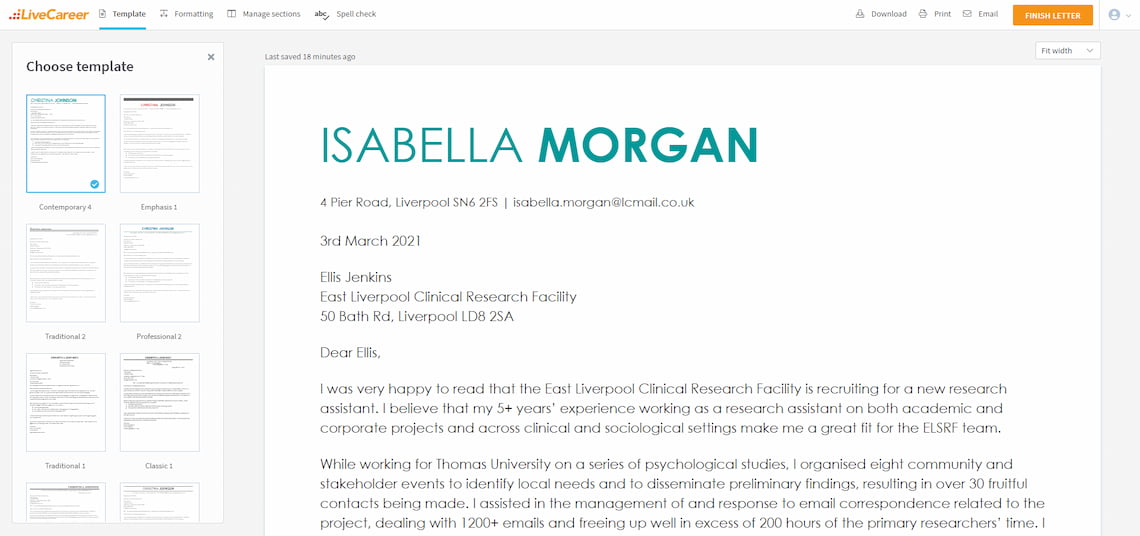
Considering other positions too? See cover letter examples for different jobs:
- Administrative Assistant Cover Letter
- Customer Service Cover Letter
- Consulting Cover Letter
- Engineering Cover Letter
- Legal Cover Letter
- Paralegal Cover Letter
- Receptionist Cover Letter
- PhD Cover Letter
- Teaching Assistant Cover Letter
Want to explore other options? See our selection of cover letter examples for other jobs .
Sample Cover Letter For Research Assistant Position
Isabella Morgan
4 Pier Road
070 2222 2222
3rd March 2021
Ellis Jenkins
Recruitment Officer
East Liverpool Clinical Research Facility
Dear Ellis,
I was very happy to read that the East Liverpool Clinical Research Facility is recruiting for a new research assistant. I believe that my 5+ years’ experience working as a research assistant on both academic and corporate projects and across clinical and sociological settings make me a great fit for the ELSRF team.
While working for Thomas University on a series of psychological studies, I organised eight community and stakeholder events to identify local needs and to disseminate preliminary findings, resulting in over 30 fruitful contacts being made. I assisted in the management of and response to email correspondence related to the project, dealing with 1200+ emails and freeing up well in excess of 200 hours of the primary researchers’ time. I also analysed over 1 GB of data and wrote three reports on secondary findings that emerged from the project, two of these reports have since been reworked into grant applications potentially worth a total of over £400,000. This is not to mention the statistical analysis I performed throughout each phase, creating over 100 graphs, tables, and charts along the way.
As you can see, my background as a clinical research assistant has put me in good stead to handle the strictly scientific and mathematical aspects of my job whereas my interpersonal and communication skills help me to excel in the more sociological aspects.
Thank you for the taking the time to consider my application. I look forward to discussing with you how I can help ELSRF in the experimental design and execution phases of the Reeves project.
Yours sincerely,
Now that’s a perfect cover letter ! Learn now how to write yours.
1. Top your research assistant cover letter with a header
Just as your notes are set out a certain way, so too must your cover letter. Frame it with a header by aligning to the right: your full name, postal address, email, and phone number. Leave a line, type the date of writing in the form ‘23rd May 2021’, and drop down another line. Now switch back to left-alignment.
All that’s left to add are the recruiter’s or hiring manager’s details. In short, the person who’ll be reading your cover letter. Type out each of the following on a new line: the recruiter’s or hiring manager’s name, their job title, company or institution name, and the company’s or institution’s postal address.
Research assistant cover letter sample header
You can adjust every cover letter created in the builder to meet the job requirements. Choose the name of your profession and the company to which you’re applying, and the LiveCareer cover letter builder will automatically adapt the content for you. Create a cover letter faster than you ever thought possible and apply for the job in record time.
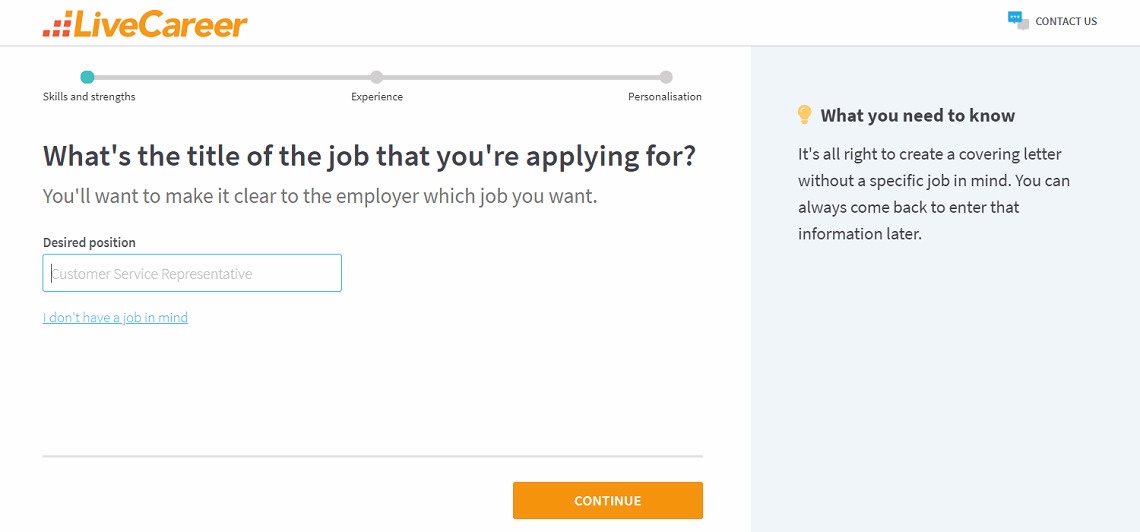
2. Address your research assistant cover letter to the right person and in the right way
What if you don’t know to whom to address your cover letter ? Consider it your first recruitment task to find out. A research assistant ought to be able to figure this out. Do some passive, desktop research to find out, but if that proves fruitless, don’t forget that calling up and asking is a fool-proof plan.
If the person to whom you’re writing isn’t too much more senior than you, and the organisation not too traditional, then ‘Dear + first name’ is a great way to address them. This greeting is both friendly and professional, while also being formal without being too stiff. It also avoids the need to use a gendered title.
You might not feel comfortable starting off on a first-name basis, though. Trust your better judgement and know that too formal is usually better than not formal enough in a research assistant cover letter. In such cases, go with ‘Dear + title + surname’, using ‘Ms’ for women without an academic title or military rank.
It happens more often than you might think that a person’s name fails to unambiguously indicate their sex. Once again, you ought to be able to find out, more or less discretely. If this proves impossible, though, then start your letter with ‘Dear + first name + surname’, e.g. ‘Dear Morgan Tate’.
Research assistant cover letter sample salutation
3. open strong to get your research assistant cover letter read to the end.
There are many over-achieving research assistants with impressive CVs applying to every research assistant position. The purpose of your cover letter is there to convince recruiter’s to read your CV. It’s also a sizeable chunk of text that takes more than a second to read. Grab your reader’s attention from the get go.
A good research assistant cover letter opening will do three important things. It’ll introduce you while showing your enthusiasm for the organisation, give a taste of what it is that you can bring to the table, and demonstrate that you’ll make for a good fit in terms of work ethic and culture.
The best way to show enthusiasm is not by gushing and flattering your reader. Rather, it’s demonstrating your knowledge regarding the organisation and its major projects that gives the impression of enthusiasm. Besides, a research assistant not doing adequate background research just looks bad.
If you have experience working as a research assistant, then you can hint towards what you can bring to your new employer by describing something that you were able to achieve for your current or former employer. You’ll find more information on how to generate these in the next section—you’ll be writing quite a few.
What if you’re writing a research assistant cover letter with no experience? Given that the vast majority of RA jobs require you to have at least a relevant Bachelor’s degree, the chances are overwhelming that you do have research experience, just not professionally. So focus on your studies and research projects.
Writing without any research assistant experience, you can augment your academic research experience with a belief statement. A belief statement allows you to make a brief case (1–2 sentences only) for why you’re a good match for the organisation. Focus on its values, mission, and culture.
Given the large number of organisations using Applicant Tracking Systems (ATSs) these days, there are a couple of simple actions you should take to boost your chances of getting past these algorithmic gatekeepers. Be sure to mention the name of the organisation to which you’re applying as well as the job title.
There’s one last thing you’ll want to mention here if it applies to you. By all means drop names if you were referred to the position for which you’re applying. The fact that someone within the organisation thinks you’d be a good fit is clearly relevant. Employers benefit from referrals and most know it.
So much is happening in this opening paragraph. You’re introducing yourself, describing a prior research achievement, slipping in some background knowledge on the organisation, possibly including a belief statement, and possibly mentioning a referral. And yet, keep it down to 40–80 words , no more, or it won’t get read.
Research assistant cover letter sample opening paragraph
You don’t have to create any content yourself. The LiveCareer cover letter generator will automatically suggest the best content for your cover letter with ready-made examples and expert tips.
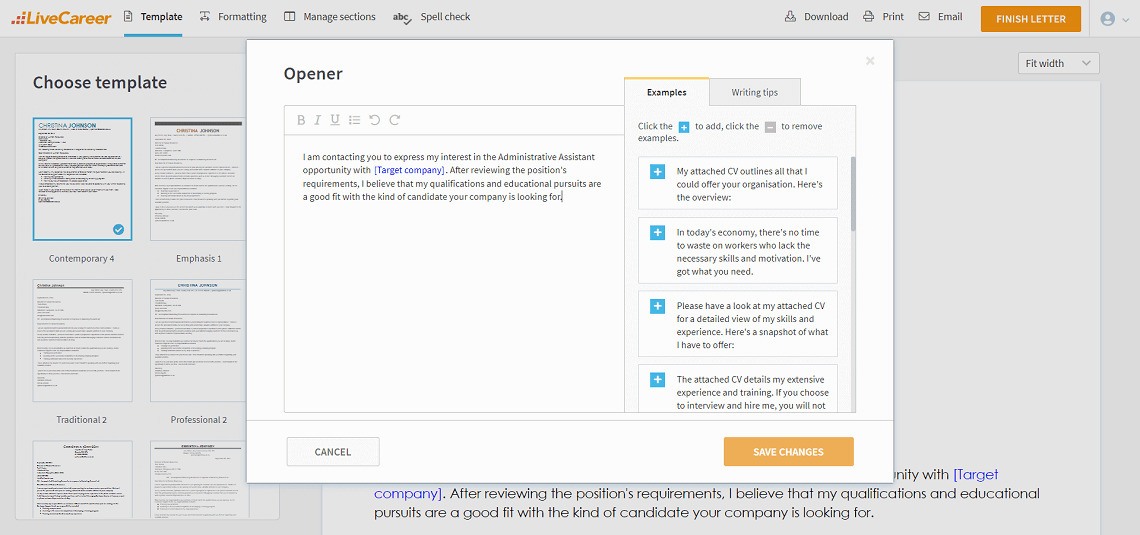
4. Use your cover letter to showcase your professional achievements
One thing you can say about the work of a research assistant is that it’s very results-driven. Use the main body paragraph/s of your cover letter to showcase the more impressive things you were able to achieve for past employers. Recruiters will be mapping that onto what they need from you.
The most effective way to do this is to, for each achievement, describe an action you took at work (often in response to a challenge or problem, even if only implicitly) and the benefits that went to your employer as a result. You can use something like the APR (Action+Problem=Result) formula to help structure your achievements.
The most important thing to keep in mind when writing up your achievements is to quantify as many aspects of each achievement as possible. This means putting numbers to the scale or frequency at which you did things and, most importantly of all, the benefits that went to your employer as a result.
Your main body paragraph will end up being made up of 2–3 such achievements , written out in quickfire succession with only minimal connecting sentences between them. It’s great if you can form a simple narrative or even argument out of these achievements, but it’s certainly not necessary.
You might consider breaking your achievement showcase into two separate paragraphs to enhance readability. You could even use bullet points if it’ll boost the clarity of your cover letter. As with every part of your research assistant cover letter, the shorter the better: aim for 120–200 words .
Research assistant cover letter: main body paragraph example
5. always end your research assistant cover letter with a confident cta.
Tying up loose ends and following things through to a rational end-point are traits of a good research assistant. Do this in your cover letter by taking 40–60 words to summarise your experience and extract key themes from your achievements. Tie these back to your new employer if need be.
Thank your reader for the time and effort they’re putting into dealing with your application. Not only is just plain good manners, but it can also act in your favour to a surprising degree. End your cover letter on a confident (but not obnoxious) call to action (CTA) through which you make clear your eagerness to move forward.
Research assistant cover letter sample closing paragraphs
6. sign off properly.
Some things are just a matter of protocol, and how you sign off is one of these. Use ‘ Yours sincerely ’ if you addressed your cover letter to someone by name. Use ‘ Yours faithfully ’ only in cases in which you were forced to use someone’s job title or recruitment function instead, like ‘Dear Recruitment Officer’.
Research assistant cover letter: sign-off example
7. keep these formatting rules in mind.
Attention to detail is so important to the work of a research assistant that it’s a bit of a cliché to even mention it. Yet here we are. Written communication skills are also a de facto requirement for this kind of research work. So your research assistant cover letter absolutely cannot contain spelling and grammar mistakes.
Proofread your work at least twice, lean on any technological aids you need, and get someone else to check over it. Make the layout of your cover letter clear and easy to follow, using white space to separate one part from another. Use a simple template to enhance its readability. Save your work in PDF to protect this formatting.
Your cover letter length should sit somewhere between 250 and 400 words in total, nicely filling an A4 page. Choose a professional-looking CV font for your cover letter and make sure the overall look of your cover letter and CV match, reflecting the fact that they constitute a single application together.
A cover letter alone simply won’t be enough—you need an impactful CV, too. Create your CV in minutes. Just follow our wizard and fill in every CV section with ready-made content. Get started by choosing a professional CV template .
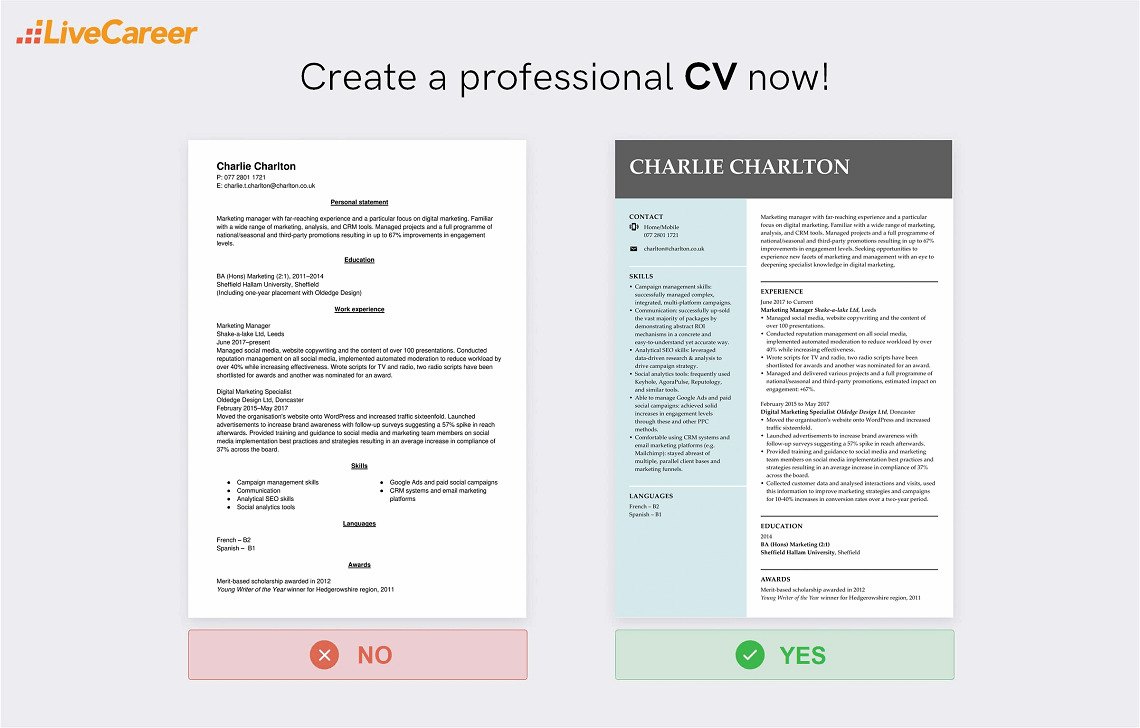
I hope this article has cut down on the research load in getting your research assistant cover letter ready to send. Was there something you wanted me to elaborate on? Please drop any comments, questions, experiences or feedback down in the comments section below and we’ll get back to you.
How we review the content at LiveCareer
Our editorial team has reviewed this article for compliance with Livecareer’s editorial guidelines . It’s to ensure that our expert advice and recommendations are consistent across all our career guides and align with current CV and cover letter writing standards and trends. We’re trusted by over 10 million job seekers, supporting them on their way to finding their dream job. Each article is preceded by research and scrutiny to ensure our content responds to current market trends and demand.
About the author
Since 2005, the LiveCareer Team has been helping job seekers advance their careers. In our in-depth guides, we share insider tips and the most effective CV and cover letter writing techniques so that you can beat recruiters in the hiring game and land your next job fast. Also, make sure to check out our state-of-the-art CV and cover letter builder—professional, intuitive, and fully in line with modern HR standards. Trusted by 10 million users worldwide.
Rate this article:
Research assistant cover letter
Looking for a job-winning CV?
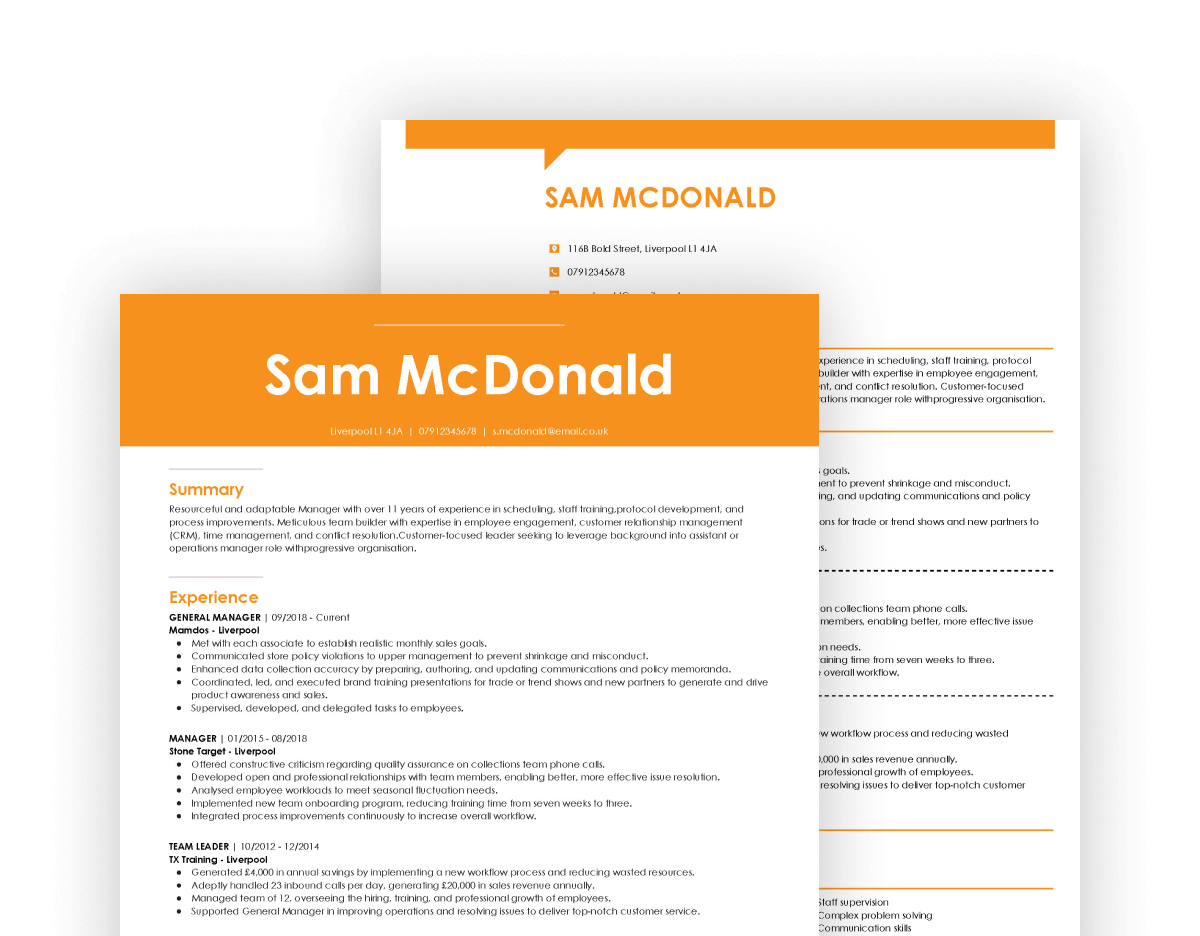
- Terms And Conditions
- Privacy Policy
- Editorial Policy

Home » Research Assistant Cover Letter: 05 Sample Ideas
Research Assistant Cover Letter: 05 Sample Ideas
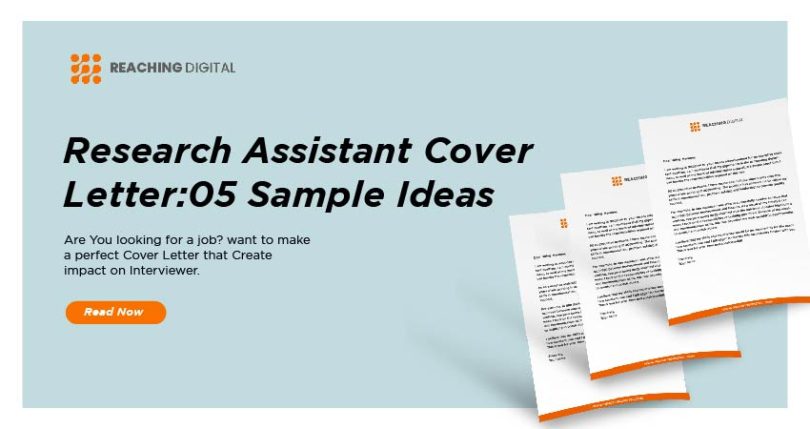
research assistant cover letter are an important part of any job application, research assistant or not. Here are five great examples to help you get started. Each is tailored to a specific type of research assistant role, so it will be easy for you to find one that fits your own experience and background. Happy writing!
Cover letters can be tricky – on the one hand you want to show how excited you are for the opportunity, and on the other hand you don’t want to seem like you’re begging. So where do you start? Check out our five cover letter sample ideas to get started! Each example is tailored to a specific situation, so find the one that fits your experience and go for it! Happy writing 🙂
Cover letters can be a challenge. They need to be engaging, show your skills and match the company’s needs, but still be unique. It can be tough to find the right way to market yourself. But don’t worry, we’re here to help! In this post, we’ll give you five research assistant cover letter examples that will help you get started. With these samples, you’ll be able to create a letter that stands out from the rest! So don’t wait any longer, start writing today!
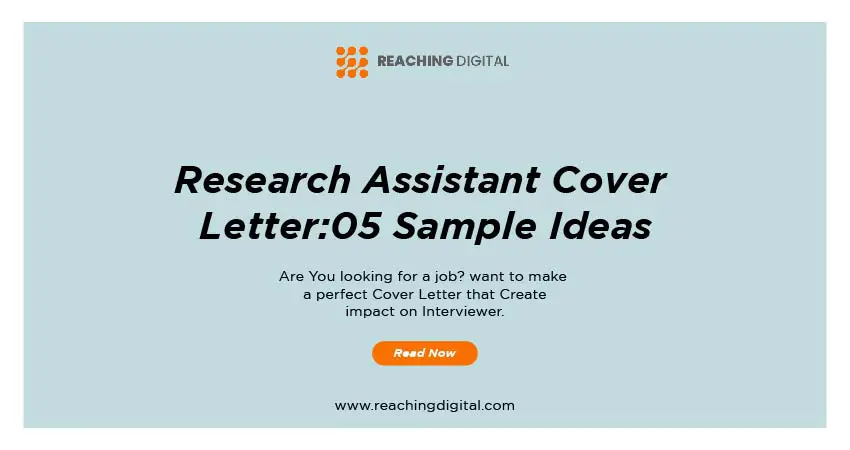
Table of Contents
Sample Cover Letter for Research Assistant with no Experience
Dear Sir/Madam,
I am writing this letter to express my interest in your available research assistant position. I was very impressed by the opportunities you offer and feel that I will be a valuable asset to your organization.
As an undergraduate student pursuing a degree in ________. I have had extensive experience working with both children and adults on a one-on-one basis. I have also had significant experience in group settings with children, adolescents, and adults on both an individual and small group level. So, I am currently completing my practicum at the _________, where I work with preschoolers who have moderate mental health needs.
I feel that this position would be a perfect fit for me and offer the following qualifications:
- Bachelor’s degree in _________
- Licensed to work with children (or at least eligible for licensure) in the state of _____.
- Proficient in MS Office applications, including Word and Excel.
- Ability to work independently and manage time well.
- Excellent verbal, written, and interpersonal communication skills.
- Ability to work well under pressure in a fast-paced environment.
- Currently available to work 20-25 hours per week during the day Monday through Friday, occasionally on weekends with advanced notice.
I have enclosed my resume for your review and I look forward to speaking with you in person about this opportunity.
Sincerely, Name, Email, Address, Contact #
Research Assistant Cover Letter no Experience
Dear Hiring Manager,
I am writing to express my interest in the research assistant position that you advertised on Monster.com recently. I was thrilled when I saw the ad and immediately wanted to apply for it because this opportunity seems perfect for me.
The reason why I think so is that throughout all of my academic career, research has been a significant part of my coursework. I started off as an English major but then switched to Mass Communications. Which allowed me to study the various ways that media has affected human communication over time.
During my junior year, I took a class on new media and was required to conduct extensive research on one particular topic. That semester was probably the most rewarding of all simply. Because of the fact that my findings were based on factual data. Although I focused mainly on social media, my research perfectly prepared me for the work that you will require of me as an assistant to your business.
After graduation, I began working for XYZ Company and have been employed there ever since. However, I am no longer content with the idea of being a secretary or administrative assistant. I have always wanted to work somewhere that would allow me to explore my passion for research further, and it looks like this job is exactly what I need.
In short, I think that my qualifications make me an excellent candidate for this venture. If you would like to talk about the possibility of setting up an interview, please do not hesitate to contact me through email or by giving me a call on my cell phone. Thank you very much for your time and consideration.
Cover Letter for Research Assistant Position
Dear Sir or Madam:
I read with interest your classified ad for a research assistant. My academic record, extracurricular activities, and professional experience make me an excellent candidate for this position. I would appreciate the opportunity to speak with you further about how my skills and talents can best benefit your organization.
During my first two years at college, I assisted a biology instructor in organizing her laboratory and conducting research. I’ve also worked as a research assistant for an environmental engineering firm and helped out with the company’s annual report. When not immersed in my studies, I enjoy singing and playing guitar at local coffeehouses.
To be more specific, it seems that you are looking for someone who has some experience writing press releases. If you would take a look at some of my writing, you would see. That I have been able to handle this type of assignment on numerous occasions. In fact, all of my previous employers were impressed with the way that I approached press release creation and wanted me to continue doing it for them.
I would be eager to speak with you about your organization’s needs and how I may be able to help you meet them. Thank you for your time and consideration. I look forward to hearing from you soon.
Research Assistant Cover Letter with no Experience
Respected Sir,
I am writing to you in response to the advertisement for a research assistant that your company posted on job portal. So, I have a Bachelor’s degree in Management and 3+ years of experience as a research assistant at XYZ university. Where I worked with Professor Jane Doe, who is one of the most respected managers in this field.
I would like to have a career with your company. Because I believe that my skill set is suitable for the position of __________. My research skills are well-developed, I have experience in recruiting participants for experiments, and I am fluent in both English and Spanish.
For this reason, please consider me as an excellent applicant for the role of _________ in your company. I am grateful for this opportunity to introduce myself. I would be delighted to meet with you further to discuss how my qualifications could make me a valuable candidate for the position of __________ at your organization.
Please do not hesitate to contact me by email or phone if any additional information is required from me regarding my application. I look forward to hearing from you soon.
Research Assistant Cover Letter Examples
Dear Sir, Madam,
It is my great pleasure to apply for the research assistant position at XYZ hospital. I am quite confident that I can be of help in your organization as I have done similar work before. Attached with this letter are my resume and transcript of grades.
As you will see from my enclosed resume, most positions I have held have involved research. I think that makes me a good choice for this position, as I am familiar with the kinds of work it will entail.
For example, during my internship at ABC Hospital, I had to deal with both human patients and lab test specimens. While there I also had to keep records of all treatment given, lab tests done, and medications prescribed. In my other jobs as a research assistant. I have had to make sure that lab procedures were conducted properly, maintain records of those procedures, and put those records into the proper computer system.
In addition to my own academic record, you will find that the XYZ University has given me numerous scholastic awards for excellence in my chosen field. For example, I was nominated for membership in the National Honor Society because of exceptional grades throughout my college career. I’ve also received an award for volunteer work with the local animal shelter.
I believe that the last several years of study at XYZ University have prepared me well for this position, and I am willing to do whatever it takes to make myself a complete asset to XYZ Hospital. I look forward to hearing from you about this position, and about how we can work together in the future.
So, what do you think? We hope these five research assistant cover letter samples have given you a little inspiration as to how you can structure and format your own letter. Remember, it’s important to tailor each application specifically to the position and organization that you are applying to. If you need any help with this or would like us to take a look at your letter before submission, don’t hesitate to reach out. We love helping job seekers land their dream jobs! Let us know in the comments which of these letters was your favorite and why. Good luck!
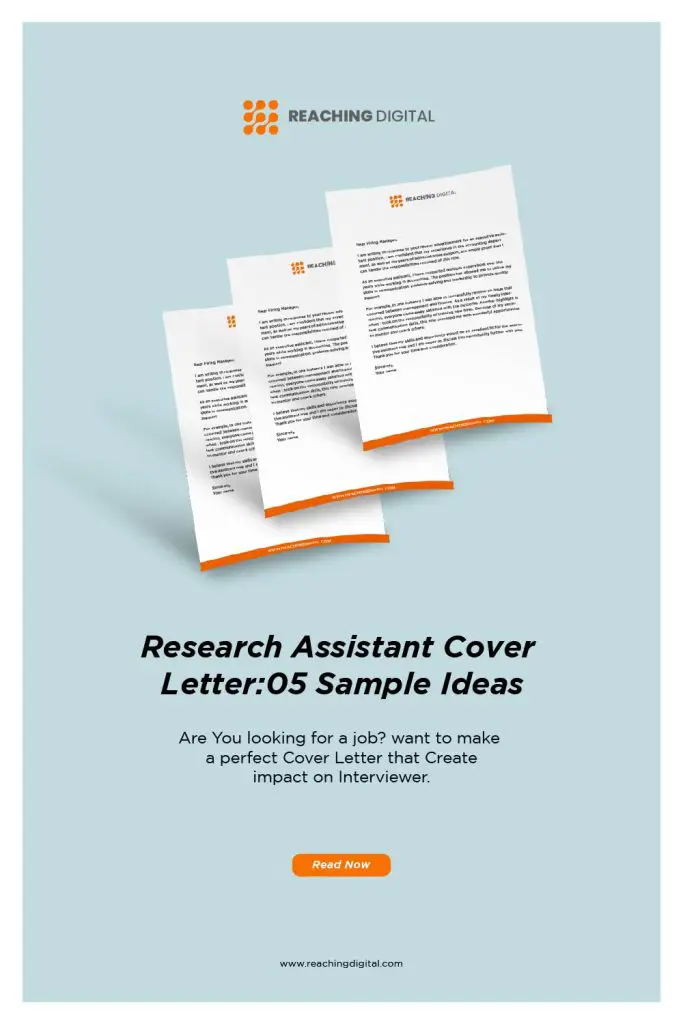
You may also like

Cover Letter for Ph.D. Application: 5 Template ideas
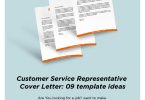
Customer Service Representative Cover Letter: 09...

Waitress Cover Letter: 07 Template Ideas
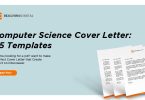
Computer Science Cover Letter: 05 Ready Template
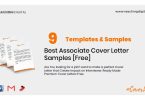
9 Best Associate Cover Letter Samples [Free]

Creative Inspiring Cover Letters: 7+ Template
About the author.
Jessica William
Leave a comment x.
Save my name, email, and website in this browser for the next time I comment.
7 Clinical Research Assistant Cover Letter Examples
Introduction.
When applying for a clinical research assistant position, your cover letter plays a crucial role in capturing the attention of hiring managers and showcasing your qualifications. A well-crafted cover letter can make a significant difference in whether your application stands out in a competitive job market. In this article, we will provide you with several examples of effective cover letters for clinical research assistants. These examples will highlight different approaches and strategies that you can use to tailor your own cover letter to the specific needs of the position you are applying for. By following these examples and incorporating key takeaways, you can create a compelling cover letter that increases your chances of landing your dream job as a clinical research assistant.
Example 1: Entry-Level Clinical Research Assistant Cover Letter
Key takeaways.
Sarah's cover letter effectively showcases her relevant experience and passion for clinical research, positioning her as a strong candidate for the Entry-Level Clinical Research Assistant position at Pfizer Inc.
When applying for a research role, it is important to demonstrate your understanding of the company's research initiatives and commitment to improving healthcare outcomes. This shows your alignment with the organization's goals and values.
Sarah highlights her practical experience, including her role as a Clinical Research Intern at Merck & Co., Inc., where she gained hands-on experience in conducting clinical trials and data collection.
Emphasize your practical experience in conducting clinical trials and collecting data. This demonstrates your ability to effectively contribute to the research process and maintain accurate documentation.
She also mentions her experience as a Research Assistant at the National Institutes of Health, where she collaborated with a team of scientists to analyze and interpret research findings.
Highlight your experience in collaborating with research teams and analyzing research findings. This showcases your ability to contribute to the research process and work effectively in a team environment.
Sarah concludes her cover letter by expressing her excitement about the opportunity to contribute to Pfizer's cutting-edge research and make a meaningful impact on patient care.
Convey your enthusiasm for the organization's research initiatives and the potential impact your work can have on patient care. This demonstrates your passion for the field and your commitment to making a difference in healthcare.
Example 2: Clinical Research Coordinator Cover Letter
Emily's cover letter effectively highlights her experience and accomplishments in the field of clinical research, making her a strong candidate for the Clinical Research Coordinator position at Covance Inc.
When applying for a clinical research role, it's crucial to demonstrate your understanding of the industry and your ability to navigate complex regulations and protocols. This showcases your professionalism and ensures compliance with ethical guidelines.
She emphasizes her experience in managing and coordinating clinical trials, showcasing her ability to handle multiple projects and deliver high-quality results.
Highlight your experience in managing clinical trials and coordinating study protocols to demonstrate your ability to handle complex research projects. This shows your attention to detail and ability to meet strict timelines.
Emily also mentions her leadership experience as a Senior Clinical Research Coordinator and her contribution to process improvements, highlighting her ability to drive efficiency and foster a collaborative work environment.
If you have experience in a leadership role, be sure to mention it in your cover letter. This demonstrates your ability to provide guidance and support to your team, as well as your initiative in implementing process improvements.
To strengthen her cover letter, Emily could have mentioned specific therapeutic areas she has experience in and any relevant certifications she holds. This would further reinforce her qualifications for the position.
If you have experience in specific therapeutic areas or hold certifications relevant to the clinical research field, be sure to mention them in your cover letter. This shows your specialized knowledge and expertise, making you stand out as a candidate.
Example 3: Senior Clinical Research Assistant Cover Letter
Michael's cover letter effectively showcases his extensive experience in the field of clinical research and positions him as an ideal candidate for the Senior Clinical Research Assistant position at Bristol Myers Squibb.
When applying for a senior-level position, it is crucial to highlight your relevant experience and expertise. This demonstrates your capacity to take on greater responsibilities and make a significant impact within the organization.
He emphasizes his accomplishments and contributions in his previous roles, such as implementing streamlined processes that improved study efficiency and reduced timelines by 20%.
Highlighting specific achievements and quantifiable results demonstrates your ability to drive positive change and improve processes. This can be particularly impactful in the field of clinical research, where efficiency and adherence to timelines are crucial.
Michael also mentions his experience in leading complex clinical trials and managing a team of research professionals, which further reinforces his suitability for the Senior Clinical Research Assistant role.
If you have experience in leadership or management roles, make sure to highlight it in your cover letter. This demonstrates your ability to not only execute studies but also effectively lead and mentor others.
To further strengthen his application, Michael could have mentioned any specialized training or certifications he has obtained in the field of clinical research.
If you have any specialized certifications or training relevant to the position you are applying for, be sure to mention them in your cover letter. This can help differentiate you from other candidates and demonstrate your commitment to professional development.
Example 4: Clinical Trial Assistant Cover Letter
Jessica's cover letter effectively showcases her experience and passion for clinical research, positioning her as an ideal candidate for the Clinical Trial Assistant position at Gilead Sciences, Inc.
When applying for a clinical trial assistant position, it's crucial to highlight your experience in managing clinical trial operations and your knowledge of regulatory requirements. This demonstrates your ability to effectively contribute to the development of new therapies.
She emphasizes her role as a Clinical Trial Coordinator at ICON plc, where she successfully managed multiple trials simultaneously and collaborated with cross-functional teams. This demonstrates her ability to handle complex projects and work collaboratively with various stakeholders.
Highlight your experience in coordinating clinical trials and your ability to work effectively with interdisciplinary teams. This showcases your project management skills and your ability to navigate the complexities of clinical research.
Jessica also highlights her experience as a Clinical Trial Assistant at PRA Health Sciences, where she honed her skills in data management and analysis. This showcases her attention to detail and ability to maintain accurate and up-to-date study data.
Emphasize your experience in data management and analysis, as well as your ability to contribute to the preparation and review of study documents. This highlights your strong organizational skills and your ability to ensure compliance with study protocols.
In addition, Jessica mentions her role as a Clinical Research Assistant at Pfizer Inc., where she had the opportunity to work on a groundbreaking study. This demonstrates her passion for contributing to medical research and her understanding of the importance of clinical trial assistants in advancing scientific knowledge.
Showcase any experience you have working on innovative or groundbreaking studies. This demonstrates your commitment to advancing medical research and your ability to contribute to cutting-edge projects.
Overall, Jessica's cover letter effectively highlights her relevant experience, skills, and passion for clinical research, making her a strong candidate for the Clinical Trial Assistant position at Gilead Sciences, Inc.
Example 5: Oncology Clinical Research Assistant Cover Letter
Samantha's cover letter effectively highlights her relevant experience and passion for oncology research, positioning her as a strong candidate for the Oncology Clinical Research Assistant position at Genentech, Inc.
When applying for a specialized role like an Oncology Clinical Research Assistant, it is crucial to showcase your specific experience and expertise in the field. This demonstrates your ability to contribute immediately and effectively to the organization's research initiatives.
She emphasizes her hands-on experience in conducting clinical research, working closely with patients, and coordinating clinical trials. By highlighting her experience at prestigious institutions like Memorial Sloan Kettering Cancer Center and Dana-Farber Cancer Institute, Samantha establishes her credibility and commitment to working in the field of oncology.
Emphasize your practical experience in conducting clinical research, including patient interactions, data collection and analysis, and trial coordination. This demonstrates your ability to handle the challenges and complexities of oncology research.
Samantha also includes a key accomplishment from her current role as an Oncology Clinical Research Assistant at Roche. By successfully managing a Phase II clinical trial and achieving a 30% increase in response rates, she showcases her ability to contribute to the development of novel therapies.
Highlight your specific achievements and outcomes in previous research projects. This demonstrates your ability to drive meaningful results and contribute to the advancement of oncology research.
To further strengthen her cover letter, Samantha could consider mentioning any relevant certifications or additional training she has received in the field of oncology research.
Don't forget to highlight any specialized certifications or training you have obtained in oncology research. This can further validate your qualifications and expertise in the field.
Example 6: Infectious Disease Clinical Research Assistant Cover Letter
David's cover letter effectively showcases his experience and passion for infectious disease research, positioning him as a strong candidate for the Infectious Disease Clinical Research Assistant position at Johnson & Johnson.
When applying for a specialized role like a clinical research assistant, it is crucial to highlight relevant experience and expertise in the field. This demonstrates your understanding of the specific challenges and responsibilities associated with the role.
He emphasizes his experience in designing and conducting clinical trials, as well as his ability to analyze and interpret data. This demonstrates his strong research skills and attention to detail.
Highlighting specific technical skills and experiences, such as designing clinical trials and analyzing data, can help you stand out as a qualified candidate. Be sure to mention any specialized software or tools you are proficient in.
David also mentions his involvement in a groundbreaking clinical trial for a new antiviral drug. This showcases his ability to manage study sites, ensure compliance with protocols, and oversee data collection.
Highlighting experience with high-stakes projects or cutting-edge research can help demonstrate your ability to handle complex responsibilities and contribute to impactful work.
To further strengthen his cover letter, David could have mentioned any specific certifications or training he has received related to infectious diseases or clinical research.
Including details about relevant certifications or training programs can provide additional evidence of your expertise and dedication to the field. Be sure to highlight any specialized knowledge or qualifications that set you apart from other candidates.
Overall, David's cover letter effectively presents his qualifications and passion for infectious disease research, making him a strong contender for the position at Johnson & Johnson.
Example 7: Clinical Data Coordinator Cover Letter Example
Elizabeth's cover letter effectively showcases her experience and expertise as a Clinical Data Coordinator, making her a strong candidate for the position at IQVIA.
When applying for a specialized role like a Clinical Data Coordinator, it is important to emphasize your relevant experience and skills. This demonstrates your ability to contribute immediately and effectively in the role.
She highlights her technical proficiency in data management systems such as Oracle Clinical and Medidata Rave, as well as her understanding of GCP guidelines. This demonstrates her ability to handle and analyze clinical trial data with accuracy and compliance.
Be sure to highlight any specific technical skills and knowledge that are relevant to the role you are applying for. This shows that you have the necessary expertise to excel in the position.
Elizabeth also emphasizes her experience in data coordination and management, including her role in developing and implementing standard operating procedures (SOPs) for data management. This showcases her ability to optimize data processes and ensure quality deliverables.
Highlight any experience you have in developing and implementing processes or procedures that have improved data management or coordination. This demonstrates your ability to contribute to operational efficiency and quality.
The cover letter could further highlight specific achievements or projects Elizabeth has worked on to showcase her impact and results in previous roles.
Consider including specific examples of successful projects or achievements that demonstrate your ability to deliver tangible results. This provides concrete evidence of your competence and value as a Clinical Data Coordinator.
Skills To Highlight
As a clinical research assistant, your cover letter should highlight the unique skills that make you a strong candidate for the role. These key skills include:
- Attention to Detail : Clinical research involves collecting and analyzing large amounts of data, which requires a high level of attention to detail. Highlight your ability to accurately record and document information, ensuring that data is properly collected and entered into databases.
- Data Management : Clinical research assistants are responsible for organizing and managing research data. Showcase your proficiency in using data management tools and software, such as Microsoft Excel or electronic data capture (EDC) systems, to ensure the accuracy and integrity of research data.
- Clinical Trial Coordination : Demonstrate your ability to assist in the coordination of clinical trials. This includes scheduling participant visits, preparing study materials, and coordinating with other members of the research team. Highlight your organizational skills and ability to manage multiple tasks simultaneously.
- Communication : Effective communication is crucial in clinical research, as you will be working with a variety of stakeholders, including study participants, healthcare professionals, and researchers. Emphasize your ability to communicate clearly and professionally, both orally and in writing.
- Knowledge of Good Clinical Practice (GCP) : Good Clinical Practice is a set of ethical and scientific quality standards that ensure the safety and well-being of study participants and the integrity of clinical research data. Highlight your understanding of GCP guidelines and your ability to adhere to them in your work.
- Analytical Skills : Clinical research often involves analyzing data and drawing conclusions. Showcase your ability to analyze and interpret research findings, identify trends or patterns, and draw meaningful conclusions.
- Problem-Solving : Clinical research assistants may encounter challenges or obstacles during the research process. Highlight your problem-solving skills by providing examples of how you have overcome obstacles or found solutions to complex problems in previous research projects.
- Teamwork : Clinical research often involves collaboration with a diverse team of professionals, including researchers, physicians, nurses, and administrators. Emphasize your ability to work effectively as part of a team, demonstrating your willingness to contribute and collaborate towards achieving research goals.
By highlighting these skills in your cover letter, you will demonstrate your suitability for the role of a clinical research assistant and increase your chances of securing an interview.
Common Mistakes To Avoid
When crafting your cover letter for a clinical research assistant position, it's important to avoid these common mistakes:
Not Addressing the Hiring Manager by Name : One of the biggest mistakes you can make is failing to address your cover letter to a specific person. Taking the time to find out the name of the hiring manager shows that you have done your research and are genuinely interested in the position. It also makes your cover letter more personalized and engaging.
Failing to Showcase Knowledge of the Company and its Research : A clinical research assistant position requires a strong understanding of the company's research goals and objectives. It is essential to demonstrate your knowledge of the company's research areas, ongoing projects, and recent publications. By highlighting your familiarity with the company's work, you show that you are genuinely interested in contributing to their research efforts.
Not Highlighting How Your Expertise Can Address the Company's Specific Research Needs : In your cover letter, it's vital to clearly articulate how your skills and experience align with the company's specific research needs. Tailor your cover letter to highlight relevant experiences, such as specific research methodologies or therapeutic areas that you have worked on. This will help the hiring manager see how your expertise can directly contribute to the success of their research projects.
Using Generic and Cliché Language : Avoid using generic and cliché phrases in your cover letter. Instead, focus on conveying your unique qualifications and passion for clinical research. Use specific examples to illustrate your skills and experiences, and explain how they make you an ideal candidate for the position.
Neglecting to Proofread for Errors : A cover letter filled with grammatical and spelling errors can create a negative impression. Before submitting your cover letter, make sure to proofread it thoroughly for any mistakes. Read it aloud or ask someone else to review it to ensure that it is error-free and polished.
By avoiding these common mistakes, you can create a strong and compelling cover letter that will capture the attention of hiring managers and increase your chances of landing a clinical research assistant position.
In conclusion, a well-crafted cover letter can significantly enhance your chances of landing a rewarding position as a clinical research assistant. The examples provided in this article demonstrate effective strategies and techniques that can be applied to create a compelling cover letter in the field of clinical research.
By showcasing your relevant skills, experiences, and qualifications, you can capture the attention of hiring managers and stand out from other applicants. Remember to tailor your cover letter to the specific job description and highlight how your background aligns with the requirements of the position.
Additionally, utilizing a professional tone, demonstrating your enthusiasm for the role, and showcasing your ability to work effectively as part of a team are essential elements to include in your cover letter.
Avoid common mistakes such as including irrelevant information, using generic language, or failing to proofread your letter for errors. Taking the time to carefully review and edit your cover letter will ensure that it presents a polished and professional image to potential employers.
In today's competitive job market, a well-written cover letter can be the key to securing an interview and ultimately landing your dream job as a clinical research assistant. By following the examples and tips provided in this article, you will be well-equipped to create a standout cover letter that highlights your qualifications and sets you apart from other candidates.
Remember, your cover letter is an opportunity to make a strong first impression and showcase your skills and enthusiasm for the field of clinical research. Take the time to craft a personalized and compelling cover letter, and you will greatly increase your chances of success in your job search. Good luck!

IMAGES
VIDEO
COMMENTS
Closing paragraph: To close the cover letter, you can reiterate your interest in the position and the research project, while thanking the hiring manager for considering your application. You can also include a statement about a career goal you have if you're chosen for the role. 6. Include a signature.
17 July 2023. Alex Reed. 5508 Terrace Drive. La Crescenta, CA, 91214. (818) 835-3371. [email protected]. Dear Dr. Reed, I'm writing to you regarding the Lab Research Assistant position at BioSpace. I'm confident my academic background in molecular biology and biomedical research experience will make me a competent contributor to your team.
We will be covering the following key components of a professional cover letter: 1. Cover Letter Header 2. Cover Letter Greeting 3. Cover Letter Introduction 4. Cover Letter Body 5. Cover Letter Closing Each of these sections plays a vital role in presenting a comprehensive picture of your capabilities and suitability for the research role.
Part 5: Drafting an entry-level research assistant cover letter Formatting your cover letter correctly. Your research assistant cover letter should be one page, single- or 1.5-spaced and contain 4-5 paragraphs. Each paragraph will have a specific purpose. Here's an outline showing the best format for research assistant cover letters.
Go with this template for your introduction. Just fill in the blanks with your information. Research Assistant Cover Letter Sample: Introduction. Dear [Hiring Manager's Name]: As a research assistant for [number of years], I was ecstatic to find an opening for [list position] at [Target Company Name].
Adaptable cover letter greeting and introduction example. Dear Professor McMahon, For the past four years, I have been working in the psychology department of Miami University as a research assistant, on both field- and laboratory-based research projects around cognitive health across a range of age profiles.
A good research assistant cover letter usually has five sections, outlined below. When possible, connect each section back to the employer and its stated hiring needs. The following advice and examples show what to include in your cover letter so it's optimized for each job application. 1. Heading.
COVER LETTER. Dear Hiring Manager, I recently came across the opening for the Research Coordinator role at your esteemed institution, and after thorough research into your organization's innovative approach to clinical trials, I felt compelled to submit my application. One of my key accomplishments was at New York-Presbyterian Hospital, where I ...
With this letter and the attached resume, I would like to express my sincere interest in the Research Assistant position you have available. As a detail-oriented and analytical professional with more than 8 years of experience in data collection and interpretation, I have gained solid research knowledge and experience that will allow me to ...
Research Assistant Cover Letter Sample #1. Dear Dr. Smith, With this letter and enclosed CV, I would like to express my strong interest in the Research Assistant position you have available in the X department. I am a recent master's graduate with experience in facilitating successful clinical trials.
Research Assistant Cover Letter Sample. Dear [Hiring Manager], I am writing to apply for the position of Research Assistant at [Company Name], as advertised on [Job Posting Website]. With my research experience and ability to work both independently and collaboratively, I am confident that I am the ideal candidate for this role.
Lancaster. LA1 4YF. (0131) 123 4567. [email protected]. Dear [Mr/Ms/Mx] [Contact Person's Name], I am writing to express my interest in the Psychology Research Assistant position advertised on the Lancaster University careers page. With a strong academic background in psychology and hands-on experience in research settings, I am ...
A closing paragraph with a powerful call to action. A complimentary close (e.g., Sincerely) and your full name. Optionally, a postscript (P.S.) Keep your research position application letter to between 200-300 words, depending on your education level and trial experience.
About this sample. This Research Assistant cover letter is a professional document that is used to introduce yourself to a potential employer and highlight your skills and experience in the field of research. This template is optimized to get interviews by clearly outlining your relevant qualifications and showcasing your ability to assist ...
Use a professional font (e.g., Arial, Times New Roman) and keep the font size between 10 and 12 points. Ensure consistent formatting, alignment, and spacing throughout the letter.Use standard margins (usually 1-inch) and left-align your text. Keep the cover letter concise, typically one page in length.
1 Research Assistant Cover Letter Example. Research Assistants meticulously gather, analyze, and interpret data to contribute to knowledge and innovation. Similarly, your cover letter is your chance to compile your skills, experiences, and achievements into a persuasive narrative that demonstrates your value. In this guide, we'll delve into the ...
2. How to Write a Cover Letter for Research Assistant Jobs Step by Step (Template) Let's get started on how to write your research assistant cover letter: 1. Format Your Research Assistant Cover Letter in an Organised Way. Observations are the first peg of the Scientific Method— You don't want the hiring manager to see a sloppy RA cover ...
3. Open strong to get your research assistant cover letter read to the end. There are many over-achieving research assistants with impressive CVs applying to every research assistant position. The purpose of your cover letter is there to convince recruiter's to read your CV. It's also a sizeable chunk of text that takes more than a second ...
Sample Cover Letter for Research Assistant with no Experience. Dear Sir/Madam, I am writing this letter to express my interest in your available research assistant position. I was very impressed by the opportunities you offer and feel that I will be a valuable asset to your organization. As an undergraduate student pursuing a degree in _____.
Free Graduate Research Assistant cover letter example. Dear Mr. Mills: With this letter and the enclosed CV, I would like to express my sincere interest in becoming your next Graduate Research Assistant. As a detail-oriented and analytical doctoral student with an MA in Health Sciences and in current pursuit of my PhD in Public Health Science ...
Example 1: Entry-Level Clinical Research Assistant Cover Letter. Dear Hiring Manager, I am writing to express my strong interest in the Entry-Level Clinical Research Assistant position at Pfizer Inc. I am impressed by Pfizer's innovative research initiatives and commitment to improving global healthcare outcomes.
A Lab Assistant with four years of experience, specializing in quality assurance, laboratory safety, and DNA testing. A proven track record of performing sample testing and extractions in compliance with ISO 9001 and quality standards. Professional Experience. Lab Assistant, DNA Testing Solutions, New York, NY October 2019 - Present
Learn how to create the perfect Accounting Assistant cover letter with ResumeHelp's expert guide and professional sample cover letter. ... She's witnessed firsthand the importance of a powerful resume and cover letter to a job search, so she takes great pride in helping change the lives of job seekers by sharing expert career advice and tips ...